#He’s my favorite Voyager character for that exact reason
Explore tagged Tumblr posts
Text
What I love about Threshold is it’s a Tom Paris Daddy Issues episode, and at the end he isn’t even upset that his own children got left behind. Gotta love unaware men continuing the cycle.
#Tom Paris is such a loser#He’s my favorite Voyager character for that exact reason#Watched it with my friend last night and said there’s no way that for Paris’s entire life#People we’re saying he was destined to achieve great things#The dude is a goof and there’s no way anyone took him that seriously#See also: the EMH is my favorite person for Paris to share scenes with#Star Trek VOY#VOY#Threshold#Threshold Day#*were saying
224 notes
·
View notes
Text
One of my favorite types of relationships in Star Trek are close friendships between characters who are in certain ways exact opposites but who nonetheless get along really well and have found strong common ground on which to base their relationship. Some examples:
Data and Deanna: Opposite relationships to emotion and opposite methods of attempting to understand/connect with other people. Deanna literally senses other people’s emotions and is about as intimately connected with emotion as a person can be, while Data believes he has no emotions and has difficulty understanding the emotional states of others. Despite this, they get along really well and greatly respect each other’s perspective. Part of the reason is potentially because both characters have a strong drive to reach out to and connect with other people, even if their starting points for this goal and their methods of attempting to accomplish it are very different.
Kira and Jadzia: Opposite in a lot of ways, but particularly in terms of their relationships to religion and other elements of their respective cultures. Religion and other aspects of Bajoran culture are deeply central to Kira’s identity and understanding of the world, whereas Jadzia couldn’t care less about religion and has an ambivalent relationship with her own culture. Sometimes, she rebels against it or seems to turn away from it in favor of seeking connections with other cultures (such as Klingon or Ferengi culture). They also have opposite personalities in many ways – such as their opposite approaches to leisure with Kira unable to relate to Jadzia’s ways of enjoying herself. Yet despite these major differences in ideology and approach to life, the two of them spend a lot of time together and are close friends. Maybe this is partially because one thing they do both have in common is a sort of open-mindedness about difference – an acceptance of a difference of perspective as it is without truly resolving it. (Up to a point, of course, especially in Kira’s case, but I do think that the fact that both of them have several close friendships with characters with whom they disagree on a large number of topics indicates that they share this open-mindedness).
Jake and Nog: Opposite life trajectories. They come from very different cultures and are introduced to the audience in opposite ways (as a well-behaved child vs. a petty criminal), but the strength of their connection is immediate and enduring despite all the barriers put between them. What makes the contrast between them extra interesting is how Nog is the one to become a Starfleet officer, and how the contrast between their personalities in later seasons (Nog being rigid and organized while Jake is more relaxed and disorganized) is very much not what you’d expect when you first meet their characters in season 1.
Harry and B’Elanna: Opposite relationships to/histories with Starfleet. Harry is the golden boy – the young prodigy with a bright future who represents the very best of Starfleet and can (supposedly) do no wrong. B’Elanna seemingly failed Starfleet and was failed by Starfleet in every sense. She couldn’t make it through the Academy because she felt like she couldn’t belong there – because she was made to feel that way throughout her life. And yet it’s within Starfleet (at least the make-shift Starfleet on Voyager) that the two of them connect and become friends. And maybe in some ways that’s because you don’t need to go far below the surface to see cracks in Harry’s supposed Starfleet perfection, and also because it takes only the promise of belief and support from a few (including Harry) for B’Elanna to reforge her connection with Starfleet.
Mariner and Boimler: Opposite personalities in basically every way (at least initially). Mariner is bold, rebellious, and reckless while Boimler is a cautious obsessive rule-follower. They approach basically every situation in opposite ways, and yet they are inseparable best friends. It’s interesting to see them both become a little more like each other over time, and maybe that trajectory is partly why they’re so close.
Interestingly, in some of these cases, what initially seems to be a great difference between two characters actually becomes a source of common ground between them – a contrast becomes a parallel. I find this kind of connection between characters who might in theory be opposed to each other very compelling. In a way, characters being best friends despite being really different gets to the heart of what Star Trek, at its best, is about.
#star trek tng#star trek ds9#star trek voy#star trek lower decks#lane posts#lane's character and relationship meta
86 notes
·
View notes
Text
Horror Movies I watched: August 2023
Bodies Bodies Bodies Well, if Rian Johnson had a plan to make the next Benoit Blanc mystery a take on And Then There Were None, he might as well scrap it now.
I'm sorta in the middle of an Agatha Christie kick, so this was extra fun, even though, mild spoilers, it almost plays like a deconstruction of her mysteries. Also, despite having a young cast with a somewhat similar premise, this movie also plays like the Anti-Scream. In that franchise, we follow a group of friends; one coming in with baggage and the others gaining them the longer they survive. Only to find whatever problems they're dealing with this time is "solved" by removing the bad apples of the group when they reveal themselves. That might be why the first one, and the fourth one to a lesser extent, are still considered the scariest; the culprits there are someone Sidney knows longer then in any of the other movies, so the betrayal hits harder. That might sound like a slam, but to be fair, a reason why Scream had such a great track record on this is that it's killers are, more often then not, a different variety of compellingly written privileged assholes and all the returning cast are portrayed likable enough for us to consider them good people.
But here, it's not so simple. The good friends don't outnumber the bad this time. Heck, the two newcomers you can make the argument are the only ones who come the closest to being innocent by a wide margin. All the trauma and hurt this group has concocted up until the events of the movie were not gonna go away by ousting the worst one. (They even literally tried that and it didn't stop anything). The best solution would've been to dissolve this friend group completely, at least for a while, but that was not on the table.
Getting back to the Christie comparisons; sure in her stories, everyone has a secret and somewhat of a reason to kill, but once the one who finally acted on that is revealed, everyone else spontaneously gets a happy ending, regardless of all previous deaths. Granted, And Then There Were None's original ending was an exception, but in a strange way, revealing the mastermind to the audience at least left them leaving satisfied regardless of everything else.
But here, once again, these characters don't even get that. It's bad enough they don't have a Benoit Blanc, Hercule Poirot type to make this easier for them (Though I would love to see what an earnest Gen Z version of that archetype would be). To make it worse, all of them are actively trying to be that, but failing miserably because they're all, except Bee,
1. coked up
2. paranoid
3. inexperienced
4. sick of their friends
5. did I mention coked up?
With the final killer reveal being a textbook example of being completely satisfactory by being completely unsatisfactory. The grand reveal was anything but. Actual parodies of this genre wish they could've nailed this.
You would think with how I described all this, I would hate this move or think less of the murder mystery type stories it's mocking, but far from it. It's not my new favorite movie, but I'm glad I saw it. Sure, there's a lot of skewering Gen Z, but I could argue you could've told this story with any generation, with a few tweaks. It's because it's main point is, well, the cozy locked room mystery unfolding in today's world would not be nearly as neat as Christie made it look. It could be fun, but it's not a solution to all your problems. If anything, it's the exact opposite because, well people you know are dying. And it's even worse when reality ensues.
It's a good deconstruction. Though that doesn't mean it should be the end of the genre. It's something the genre can build up from and consider. Maybe either discourage from getting too realistic or to do so with a point.
The Last Voyage of the Demeter Like Haunted Mansion, this is another horror film that's not fit to release in Summer! Sure, it's release date is close to when these events took place in the novel (August), but given the tone it went for, closer to Autumn would've felt appropriate.
Here's a tangent. I know I watch horror movies all year long and my enjoyment of each of them doesn't hinge too much on what time of year. But I have a theory that certain types of horror movies do well or are more successful depending on what time of year are released in conjunction to what type of movie they are. From what I observe, I would think the type of horror movies that do well in the summer evoke more summer imagery, like outdoor recreation, wilderness, lighter tone. Jaws and any of the Friday the 13th movies are a good example. This movie, while set mostly at the sea, has a far darker tone than anything considered fun, especially when compared to what the layman would think they'd get from "Dracula on a boat".
And sure, while going goofier like Renfield might've helped it's mass appeal, I appreciated that it honed more to the book's dour doomed tone. (And besides, we already got Renfield this year, so our bases are covered).
The ending's a bit weird. On one hand, I'm weirdly glad it didn't pull as many punches as to who would make it and who wouldn't as I thought they would. On the other, I'm not sure how the character who survives would factor into the next chapter of the story if at all. Would he take another characters place? Get killed off within 5 minutes? We divulge from the book even more? Then again, that's assuming there was ever a sequel in mind here, box office results be damned. So even my problem here isn't even an actual problem.
It's a simple fact that in the original, Dracula was not a sexy seductor with a silver tongue, but more of the creeper in the back you don't see most of the time. In a weird way, nakedness aside, this might be the most true to the book version of the character I have ever seen. Honestly, it's to the point where, while I'm fine with sympathetic, human vampires depicted in movies, I kinda want, if are more depictions of Dracula the character, more versions of him where he's the exception to that again; an unsexy, perverted, entitled, bastard. The type of vampire no other vampire would want to associate with, because they think he's a creep. Like I said, cover all our bases.
Wrong Turn (2021) I haven't seen any of the other movies in this franchise. It never really looked like my thing. Still, I heard good things about this one so I was curious.
As an avid nature walk visitor, this is pretty much my worst nightmare about what would happen if I ever leave the trail. Booby traps, Territorial cults, regressing to a more animalistic state; it's all here.
I'm not sure about it's attempt at class commentary; only one of the city folk comes off like an asshole, and only one of the mountain cultists, any who's not an extra, seems to not be evil. And the former is the white guy and the latter is the little girl, i.e. the exact one's you'd expect. I preferred how Pumkinhead handled this myself. Not only was the inciting incident a bit more morally grey in that it was an accident, but it was clear even some of the mountain folk in that one thought the retaliation went too far, even if they couldn't do anything.
It's a shame that the part where Matthew Modine being guided through the mountains by those two guides was so short. I would've loved a whole movie if that was our main plot. It was a bit refreshing.
Pearl Toldja I was planning to watch this after X last year.
First off, Man I miss saturated colors in film. It easily makes any shot look more visually interesting, even when it contains the most mundane things. Sure, it shows up in a lot of recent films I watched, but usually in films also set in dark place, so there's a lot of black too. Yeah yah, makes what color is there pops, but I missed when more then half the screen popped. Course I guess that makes me a sucker, because that makes when this film gets grosser as it goes along even worse. Now you can see every maggot on that pig!
If you put this on after X, without knowing exactly what type of horror movie it was going to be, what you expect? Another slasher? But that only really made sense because the previous movie was made in the style of the kind of horror movie fit for that setting. That would be out of place in this WW2 setting. Supernatural? Could fit, if you took hints from Dracula or Frankenstein (the latter one you can argue it sorta did, but it clearly wasn't the main inspiration). But a supernatural element wouldn't have added to the themes Ti West was tackling. Going for 1918 specifically could seem arbitrary, aside from a reason why all the extras had to have masks. But of course, once the audition started being a plot point along with the scarecrow scene, made it clear what West and Goth had in mind for this film alone, and not just as part of the trilogy as a whole.
Not only was the a complete dark inverse of the Wizard of Oz and psychological horror structurally like May or Taxi Driver, it's a sad commentary that even when filmmaking was new, when Hollywood was just starting up, the myth so many young folk, especially women, believed over the decades that if they could make it into movies, all their problems would be over. The movie offers the horrible idea that none of these dreams never had a chance, no matter the time, not even when Hollywood was new. Even before the idea of a "Star" was a thing or a gimmick, men like the ones holding this audition was looking for their idea of one rather than actually help someone become one. This wasn't a good dream gone bad; it was always been a con. There's never been anything over the rainbow.
I have more to say, but I think I'll save it for MaXXXine when that comes out, so I can say it about the trilogy as a whole. Of course, now the question is what kind a movie would that be. As affecting as this was, is it strange to say I'll be a little disappointed if it was just this movie again, but in the 80s? I don't think West and Goth would've made a trilogy if it that's all that would happen.
Well, that's all for now. We're now pretty much in spooky season, so my yearly marathon is coming up real soon. It's going to be exciting!
1 note
·
View note
Text
❤️Favorite Canon facts about Chakotay :D❤️
-He has a twisted sense of humor as stated by belanna. His sense of humor was always very subtle and easy to miss, I think his best example of his twisted sense of humor was in the episode revulsion when he was teasing harry about his obvious crush on 7. Harry needed that tbh 💀
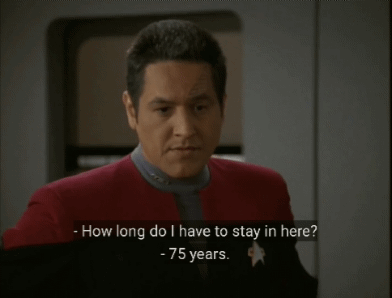
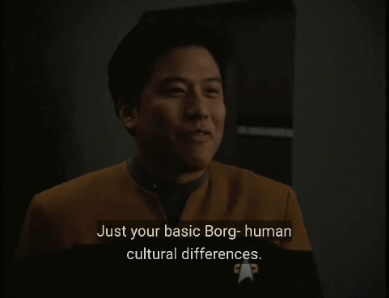
-He can't dance. I can't even imagine chakotay dancing, so this makes total sense to me, like he probs has rhythm. Im sure he knows how to rock his shoulders to the beat, but that's all he's got. I can imagine him at some starfleet ball being asked to do some basic ballroom dances and completely tripping over his own feet. The that of that brings me immense joy. idk why lol.

-He doesn't like fried food..... can't get behind him with that, major L opinion my guy 😞 fried food is what makes the world a better place
-He listens to jazz. He just like me fr 😫 I love me some jazz, bossa nova to be exact. It was a bit refreshing to see because it seems like for some reason all trek characters only listen to classical, with the exception of Tom. Which is like..... boring, I get their smart and all but smart people can listen to other genres. I realize jazz is a "smart people" genre as well, but it was a step and I'll take it.
-He's an anthropologist. Good choice and a good field, all though he does mention that he wanted to do paleontology???? I actually don't know what he was now that I think about it, but both make sense for the character. It was always so cute to see him get excited about anthropology and the alien cultures. We got so little of that :/
-His clothes were beemed off of him in a transporter accident 💀... I needed more details on this story cause wth lolol
-Gonna clump these together he can cook, he likes sand art, he's a lil handy man :3. He hates carrots and pudding??? Random, but I'm grateful for the smaller details they should've shown him poking around a bowl of pudding, i wouldve enjoyed that. Such quaint little traits.
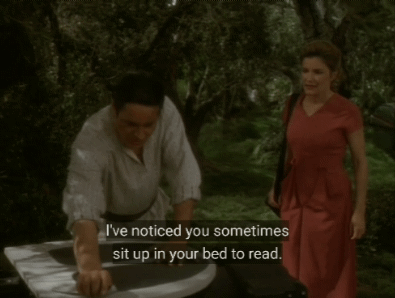

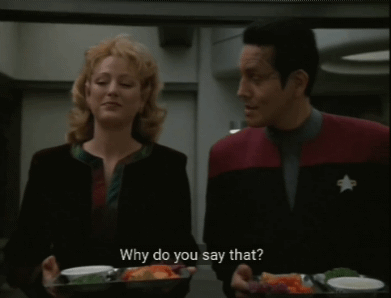
(I actually hate this episode sm. Like who was this little weirdo. It was awkward and hard to watch. It felt like they were trying too hard to get me to sympathize with this random character, and trust me, I was not sympathizing, lol. It was uncomfortable watching a character share so many intimate details about him, and I know that chakotay was a very private person, so I feel like he was uncomfortable the whole ep too. He ended up being a lil hoe in the end, though 💀💀 sorry for the rant had to get that off my chest lol)
-The fact that dude was a full-on terrorist. I always felt they did a poor job at showing his growth. Most of his development from when he was maquis up until him becoming 1st officer was not propely displayed on screen. It seemed like it happened within the span of a single episode. I wanted TO SEE IT. Voyager fell victim of that quite often though, but that's a whole other conversation to be had.
Bonus: he can't use chopsticks lol can't relate 💁🏾♀️ what a bozo
#star trek voyager#chakotay#i love him so much#sorry for rambling#captain chakotay#commander chakotay#robert beltran#st voyager#sorry for any grammatical errors#i am dumb#i can’t help but misspell words from time to time
17 notes
·
View notes
Text
I feel like I've made this post before but I'm bored and thinking about Deep Space Nine and so thus I must rank all star trek series on their levels of gayness
The Original Series: literally so gay but in a like. Homoerotic undertone way. Like Sam and Frodo looking longingly into each others eyes. Like the original Holmes and Watson proclaiming their respect and adoration for each other. 10/10 gay
The Animated Series: never seen it. Theres a catgirl tho, so I guess a 3/10??
Next Generation: I love TNG but there is not a single gay on the crew. 5/10 and that's only because Q exists. Its a crime that Picard had to be a brick wall of heterosexuality because Kirk and Q would've made out on the bridge.
Deep Space Nine: ABSURDLY GAY. Dax = trans. Garak exists. Bashir falls in love with anyone of any gender that pays attention to him. Kira has a weird poly thing with the O'Brians and also shes an angry bisexual activist. Odo and Quark are little gay rivals. Ezri is a baby enby. 1000/10 gay, Worf had the biggest culture shock for this specific reason when he joined the station.
Voyager: My comfort star trek despite being almost as straight as TNG. Thankfully the Doctor is a very Frasier-esque gay and Seven of Nine is an asexual lesbian half-cyborg which is enough. 6/10 gay
Enterprise: Shran is Obsessed with Captain Archer and I'm very happy for him. Malcolm is gay and I will not take questions about it. 5/10 gay but also T'pol and Tripp are like the best straight couple in star trek because of the LONGING.
The Alternate Series: great movies, Chris Pine is very attractive. Unfortunately, oops all straights. 0/10 gay
Discovery: First actual gay representation in star trek. Tig Notaro makes me happy. The doctor/engineer (can't remember their names) couple was clearly written by someone that shipped Tripp/Malcolm. 8/10 gay, points removed for making it very normal and background-y and not having the chaos of TOS and DS9
Picard: Seven is a lesbian and Raffi is cool. Overall my least favorite new Star Trek series but in terms of gayness, a good 9/10
Lower Decks: Beckett is bi and Tendi is trans and thats that folks. Also some fun shout outs to Spock/Kirk. 9/10 gay
Prodigy: kids show that hasn't really established romantic relationships between any characters, gay or straight, so I've disqualified it from getting a ranking.
Strange New Worlds: Nurse Chapel is the bisexual Kira never could openly be in the 90s. I'm in love with Ortegas. Spock is technically straight but has the exact same homoerotic undertones with Pike that he does with Kirk so like. Very accurate to the mythology. 10/10 gay.
#star trek#Sam rambles#its 9pm I took a delta 8 gummy to relax and all I can think about is star trek
16 notes
·
View notes
Text
Thoughts re: Tom Paris’s age vs Bobby Davis’s age
Ok let me preface this with one thing: I usually don’t give two shits what other people in fandoms have for their headcanons. Half the point of fandom is to have fun and enjoy what you enjoy regardless of what others think - I stand behind this 100%! I love hearing about and sharing new and varied headcanons!
HAVING SAID THAT
I saw someone once using the age of the Bobby Davis holo-character in “The Killing Game” as proof for Tom Paris’s age (this is even mentioned off-hand as possible in the Memory Alpha page for his character) - and it makes me want to YELL FROM A VERY TALL BUILDING.
And if you’ve made it this far already, please let me explain to you why.
I understand why some folks would use this - so many characters don’t have listed ages or birth dates in Star Trek, but we get an exact timeline for how old the holo-character of Bobby Davis is. He says he was in France for a summer as an eighteen-year-old in 1936, and then we know he came back during the war in 1944. So that gives his age as 26.
But here’s the thing? THIS IS SEASON 4 OF VOYAGER. I know that Voyager is a little behind in the one-season-equals-one-year thing, but it’s still pretty close. Either way in Season 4, the holo-character/fake personality of Bobby Davis is canonically 26 years old.
By that metric, if Tom Paris was 26 in Season 4, that would make him 24 in Season 2. And this is where I can’t deal with this as “proof” for Tom’s age. I haven’t read any of the beta-canon books (even though I know many have), but as far as I’m concerned, if it’s not SEEN ON SCREEN or SAID ON SCREEN within the 7 seasons of the show, it’s not canon.
that’s probably my training in theatre script analysis kicking in, but sue me
Anyways, if you’re with me so far, now is the time to bring up everyone’s favorite abomination: “Threshold”. Yes, I’m back on my bullshit again with “Threshold”, but it’s for a good reason and mostly because it gives us a ton of backstory and character information for Tom. He gives a very impassioned speech to Janeway in the episode when she’s telling him he shouldn’t risk his life for the Warp 10 flight. And you know what he ACTUALLY says?
“Captain, this is the first time in ten years I feel I have a life to risk”.
Ten years. TEN YEARS since he felt like he had a life to risk. Are you telling me that this man has felt like that since he was FOURTEEN?
Because that’s what this would get you, if you assumed that Tom Paris and the holo-character of Bobby Davis were the same age. I get that we know Tom’s childhood was rocky because of his father - but he also fondly recalls memories of playing in his room and losing his virginity at 17. It seems a bit drastic to think Tom would see his life as meaningless before he was more than a young teenager.
Now if you want to go deeper, I personally believe that Tom’s line from “Threshold” refers to how he felt after Caldik Prime. We know for a fact that he was drinking and being hired as a mercenary after getting kicked out of Starfleet; he says this himself to Janeway in “Caretaker”. Clearly after being thrown out, he was not in a good place. It’s also implied in “Non Sequitur” that he’d have ended up right back as a drunk if the events of the first episode had gone different. In fact, though it is an alternate reality, the Tom Paris in “Non Sequitur” also says something similar to his later lines from “Threshold”:
“Let’s just say It’s been a long time since anybody gave a damn about my future, including me.”
I highly doubt that Admiral Paris “didn’t give a damn” about Tom’s future when he was only fourteen. In fact, Tom’s quote from “30 Days” shows his father had very specific opinions on his young son’s future:
“I had it all planned out. Finish high school, join the Federation Naval Patrol. But my father had other ideas.”
So if you were to agree that the incident at Caldik Prime is the basis for the “Threshold” and “Non Sequitur” lines, that would mean it had been ten years since the accident by Season 2. If that were the case, then there’s no reasonable way that Tom could be the same age as his Bobby Davis character, because that would be way too young.
Personally, I am of the opinion that Tom is the same age as Robert Duncan McNeill was when making the show - so about 30-31 during “Caretaker”, which would put him around 22 at Caldik Prime (if the accident was indeed 10 years before “Threshold”). Since Starfleet Academy takes 4 years (and Harry Kim is supposed to be 22 and fresh from the academy too when he joins Voyager as his first assignment), Tom easily could have joined the academy at 18 years old and finished when he was around 21 or 22 - followed shortly by being stationed on the Exeter and ending with the accident at Caldik Prime. That would line up perfectly with the quote from “Threshold”.
I find that to be a very reasonable timeline.
So anyway thanks for coming to my TedTalk
#tom paris#voy#star trek#st: voy#listen I have a LOT of opinions#on Tom Paris#especially about his character age#it's the autism babeyyyyy#just can't stop hyperfixating on minor details
4 notes
·
View notes
Text
The Voyage So Far: East Blue (Part One)
east blue (1 | 2) || alabasta (1 | 2) || skypiea || water 7 || enies lobby || thriller bark || paramount war (1 | 2) || fishman island || punk hazard || dressrosa (1 | 2) || whole cake island || wano (1 | 2)
so!! hey folks. as i’ve mentioned before, to mark the upcoming chapter 1000 (holy shit!!) as well as my blog’s first anniversary this december, i decided it would be a good time to go back and put together some highlight reel posts of my favorite panels/moments/scenes from each saga and some commentary about what i think the best parts of each arc and the series as a whole are and why, as a celebration of just how far one piece has come and how many fantastic moments we've had so far!
this will be quite a series of rather long posts- they’ll all be tagged #the voyage so far, if you’d like to avoid this messy retrospective. i'll be posting one saga a day each day until chapter 1000's official release on january 3rd!
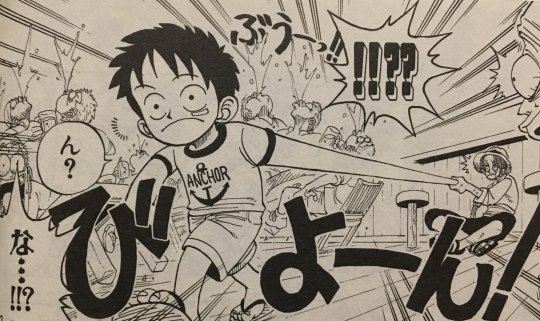
honestly, i’m opening with this panel because it has a special place in my heart: i’m pretty sure it was the first time that one piece ever made me laugh.
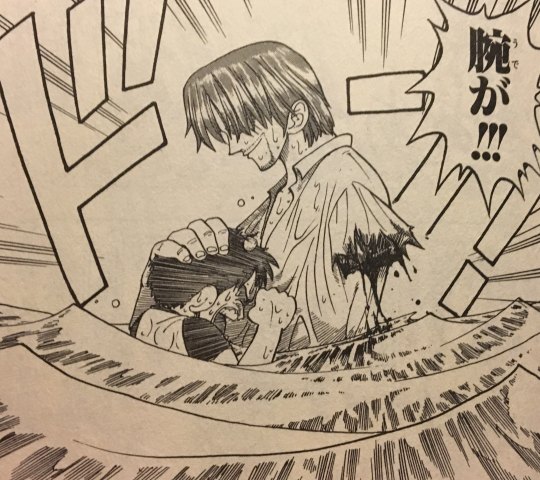
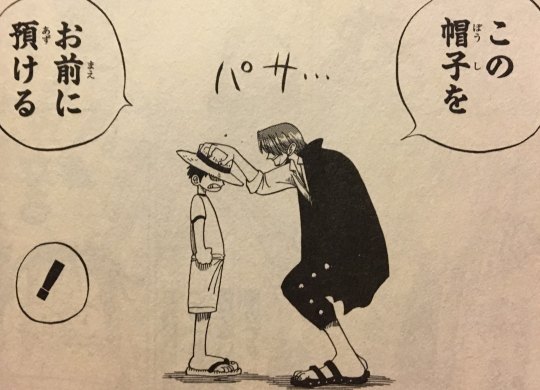
the entire prologue does a really good job of setting up the tone for the entire rest of the story. i think i haven’t really written much about it before, but i really love romance dawn. it hits the exact mix of humorous and serious that’s practically one piece’s trademark tone, and introduces us to some of the main themes of the series: inherited will especially, and the theme of freedom, and the idea of betting your life for what you love.

technically this isn’t the first time we see luffy as an adult- he punches out the sea king before this- but it is his formal introduction, as well as (in the chapter title) the first time he’s referred to as strawhat luffy/mugiwara no luffy.
i really like a lot of these very early panels of luffy, really. i’m a writing person, not an art person, so i can’t really explain why, but there’s something about how he’s drawn that i think is just delightful for some reason. i like the earlier one piece art a whole lot in general, even though it’s often much less intricate and more simple than the current artstyle (which is not by any means bad either!! it’s just different). i think it fits the atmosphere of the start of the story very well- a journey just starting out.

he’s going to be pirate king!!

i’ve complained before about how zoro’s backstory doesn’t really hit the way a lot of the others do, mostly because it goes so fast, and kuina’s death is unfortunately the closest the series comes to fridging, but- that said, i do really like the core of it. i really like zoro being motivated by a promise to the one friend and rival he could never beat, and i love how this moment is what he cites later on while facing mihawk: a promise to a friend.



i love all the strawhats and their dynamics, and seeing the crew grow and develop and become a family over the course of hundreds of chapters is one of the great joys of one piece, but i think i’ll always have a soft spot for luffy and zoro’s relationship. there’s never really any conflict between them after their very first meeting; there’s loyalty and dedication and understanding there that starts from this moment and never really wavers.
it makes me grin to see the two of them, here at the start of it all. they don’t have a flag or a ship or a destination, yet, but this is the start of the strawhat pirates.

this series will probably reveal that i have a great weakness for group shots, and i think oda is particularly good at them- especially in these earlier arcs, you can usually see every character’s personality and feelings coming through in how they’re placed and what they’re doing.
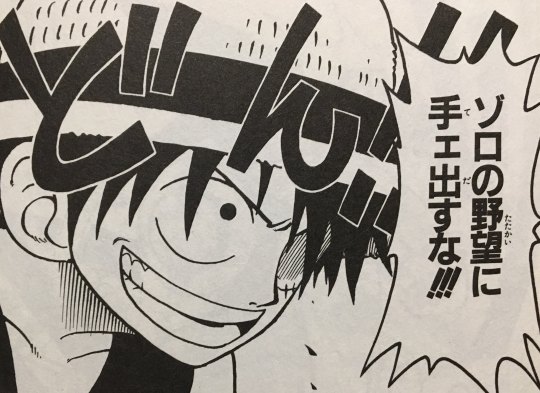

i had actually forgotten that usopp did this, and while i know kuro was egging him on on purpose, i feel like he doesn’t get enough credit for being a reckless idiot sometimes. there’s a reason he fits in as a strawhat, after all, even if he himself isn’t always aware of it.

this is a lovely panel just on its own, but i think it (and all the other appearances of sunrise and dawn in the story) hits different now, with all the 'coming dawn’ theming that’s been established in recent arcs.
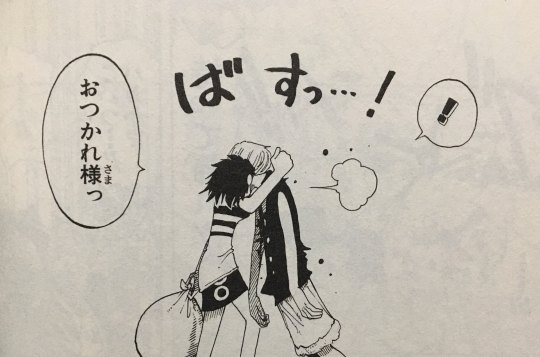
oda often absolutely nails his use of negative space to emphasize heavy little moments like this, and i for one absolutely love it. this one in particular gets me in the heart.
i like how you can reread some of these early arcs and see nami’s affection for the crew growing in little moments like these, and it’s very sweet, but there’s also a quiet kind of sadness in knowing she’s spending the whole time knowing she’s going to have to betray and leave them eventually.
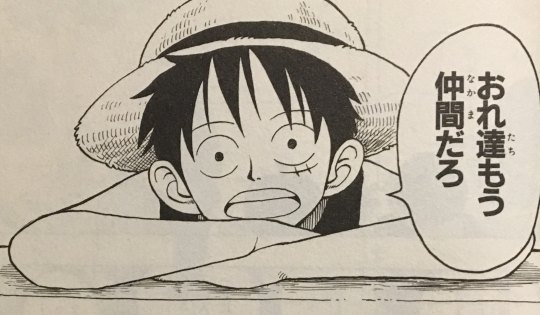
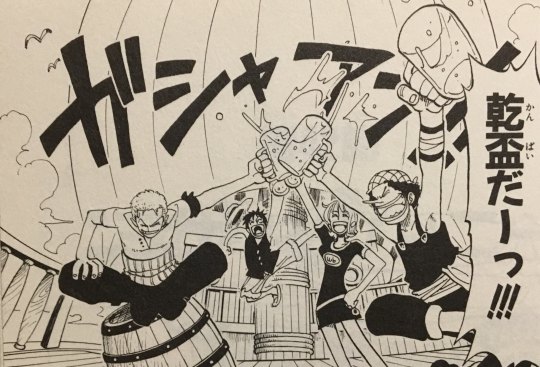
i LOVE the new crewmate toasts. they all always look so happy.
also, in my opinion, this is the first time the strawhat pirates feel like a proper crew. they have a SHIP now! and just after this, they get their jolly roger to seal the deal.

it is my opinion that sanji has one of the best character introductions i’ve ever seen. in just a few chapters we know just about everything we need to know about him: he's not to be fucked with, he has extremely high respect for food and absolutely none for morons, and the first genuine smile we see from him is when he gives a free meal to a starving man.

i think about this moment a lot, really. luffy knows almost nothing about sanji at this point. he hasn’t tasted his food- he doesn’t even know his name. but he’s seen sanji give free food to gin for no other reason than that he’s hungry and it’s right, and that’s all it takes for luffy to decide that sanji is gonna be his cook.
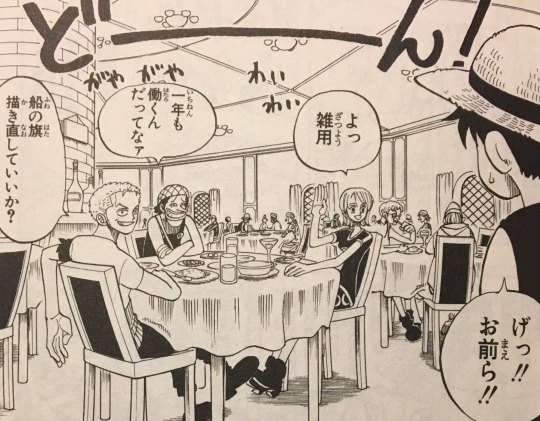
baratie is mostly a serious arc (and leads into the even more serious arlong park), but it has some really good funny moments towards the start and this is one of them. you know they’re friends because they all just start roasting luffy without sympathy or hesitation.
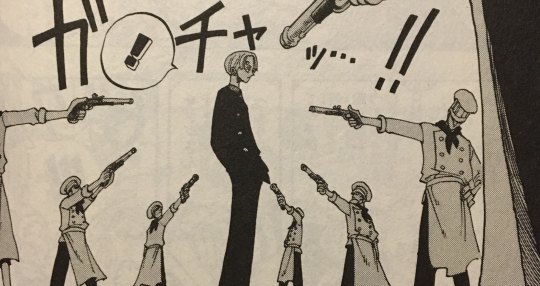

i’ve mentioned before that the zoro and mihawk fight was one of the big things that hooked me on one piece (the other being sanji’s backstory), but the way it ends, especially, is one of my favorite moments in the whole series. i love,, strawhat loyalty moments. carve “any complaints, pirate king?” on my fucking grave.

sanji has a lot of really great action panels in this arc, but this is one of my favorites mostly because his combat abilities are being revealed to the audience at the same time they’re revealed to a lot of the characters watching. i can’t remember who pointed it out but sanji’s character design (especially pre-timeskip) just really looks like he’s designed for kicking- shiny black shoes, about 70% leg- and it really shows in panels like this.

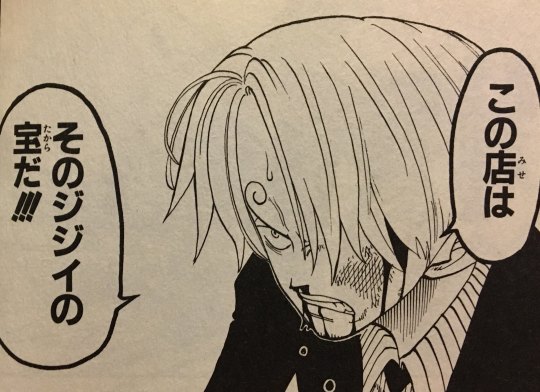
sanji and zeff’s chronic inability to communicate is kind of the emotional core of baratie, and i think sanji calling the restaurant zeff’s treasure sums up the entire conflict between them very neatly. of course zeff values sanji way more than the restaurant, but zeff will never tell that to his face and sanji has negative zero self-worth so he’s never going to figure it out on his own. so they’re basically in a stalemate.
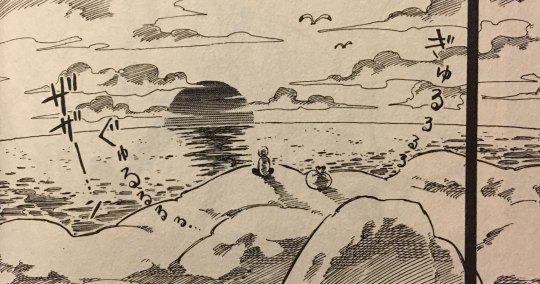
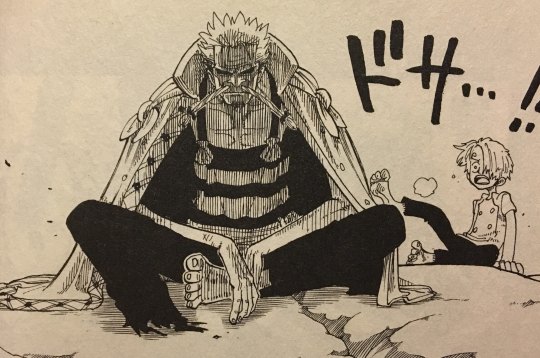
sanji’s backstory is absolutely brutal. we spend a truly agonizing amount of time literally just watching him slowly starve to death. it’s no secret that oda is really amazing at backstories, but i think sanji’s is probably one of the most effective at driving home exactly where his very specific mindset as an adult comes from. it’s hard to even read this section and not come away with at least a little more appreciation for food.
(to be continued in east blue part two!)
#the voyage so far#one piece#opmeta#arc: romance dawn#arc: syrup village#arc: baratie#not japanese#long post
289 notes
·
View notes
Text
Bon Voyage

I stumbled across a thread about the casting of the One Piece adaptation and the conversation around it is f*cking wild. Apparently, some asshole was upset Nami was cast with a white actress and, boy, did the internet light this motherf*cker up! If you don’t know, Oda had a very specific vision for the Star Hats. He actually elaborated on how he modeled the characters. Luffy is Brazilian, Usopp is African, Robin is Russian (The eyes and nose bridge are a dead giveaway. Also, she’s my favorite), Zorro is the only proper Japanese character on the crew, Sanji is French, Franky is American, Chopper is Canadian, Brook is Austrian but a skeleton so it doesn’t matter, and Nami is f*cking Swedish. The creator of the manga, specifically designed Nami to BE Caucasian. Obviously, there was a slew of like-minded Blue Checkmarks swarming in defense of this incredibly shortsighted observation, even after it was pointed out that Nami being White is accurate to the creator’s vision. It shifted to “WOC would be more represent in Asian media” which, in of itself, is f*cking ridiculous. Someone even said Nami should have been Black. Motherf*cker, what? It’s wild to me that these Twittiots don’t understand how absurd they sound. They scream “diversity” when the Straw Hats are a literal cosmopolitan crew. They were designed, from the very beginning with diversity in mind. How is it a problem that two of them are White? I mean, Franky is American but he's more a caricature of American Culture than any actual ethnicity so, you know, there's that. Also, Chopper is a f*cking reindeer and Brook is a whole ass skeleton. How is Nami a problem right now? Beyond that, the one thing both anime fans and Twatter assholes hate the most with US adaptions, is the lack of authenticity.

Everyone hates Death Note and Ghost in the Shell for that exact reason. Say what you will about the quality of the upcoming Netflix take on Bebop, they f*cking nailed that cast and they did it again with One Piece. Have you seen this thing? It’s perfect! It lines up with exactly how Oda draws his characters, as abstract as they are. It would be more prudent to be concerned with the quality of the effects going into this show because i am terrified at how the Gum-Gum powers will look. Rubber powers never translate well to live action, check out those old Fantastic Four flicks, but that cast is unassailable. It screams accuracy, the first step in making a passable adaption, and is perfectly diverse. There’s a lot of color on that cast, bud. I mentioned this when Alita came out, but i think we’re on the other side of poor anime adaptions. Alita: Battle Angel was really good and definitely raised the bar. Just like comics, it took some time for these things to be taken seriously. Anime and manga are destroying comics right now and have ballooned into a multi-billion dollar industry so you better believe they’re serious business now. It feels like we’re approaching that weird era of Franchise Marvel films, right before Iron Man kicked off the MCU and Ledger won that Oscar for playing Joker. It feels like we’re right on the cusp of getting consistently good, faithful to the source material, anime adaptions going forward and motherf*ckers are really mad that there isn’t forced diversity in them? On a project that is already diverse as f*ck? Are you kidding me? Can you assholes just stop? Please? You’re attacking the very thing you pretend to care about. You’re basically telling everyone your performative outrage is all bullsh*t. It’s embarrassing at this point.

5 notes
·
View notes
Text
Year of Recovery- A J/7 fic
Hello! I’m new to the J/7 fandom, but Voyager has become one of my favorite quarantine watches. I’ve only just watched it for the first time now, and I got sucked right into this ship. I’ve got so many fanfiction ideas swirling around my brain now, and I’ve started writing one of them! This story won’t be complete for a while, but I wanted to put up a couple of snippets of what I’ve written so far to start engaging with the fandom!
This story’s current working title is Year of Recovery, and it is a slightly AU take on the Year of Hell episodes. Janeway crashes Voyager into the Krenim time ship, and successfully prevents the Year of Hell from happening. But what if the timeline wasn’t restored quite as neatly as she had hoped?
-----------------------------------------------------------------------------------------------------------
Day 226
This was the moment that would change Kathryn Janeway’s life forever.
This was the moment that would end Kathryn Janeway's life. Forever.
She inhaled deeply, staring out the massive tear in the hull of her ship where the forward viewscreen had been just moments ago, watching the ensuing battle that raged around her. Watching her enemy just beyond the gradually weakening emergency force field, the only barrier left to prevent the cold vacuum of space from extending into the bridge. She was already dead on the inside, the empty expression on her face reflecting the weight of the past year’s immense losses and traumas.
So much loss, so much pain, she could scarcely recall it all. Except she could, in terrible, excruciating detail. Every hit Voyager took, every crew member she lost, every friend gravely, even permanently, injured. Every moment of the past year was burned into her brain as indelibly as the scars from the deflector room fire had been seared into the skin of her face, arms, and hands.
The flames and weapons fire that were both battering and emanating from the time ship, perhaps the worst enemy she’d ever faced, leaped in the glassy mirror of her eyes. For the first time in months, the flames of her own internal fire surged up to meet them, and she had a moment of such pure clarity, she could almost cry at the simplicity of it all.
The voice of her chief security officer crackled in over their comm link. “All our ships have been disabled, Captain. Do you have weapons?”
“Negative, torpedo launchers are down.”
“How do you wish to proceed?”
“I’m setting a collision course.”
At first there was no response. Tuvok said nothing, but the voice of another came through, strangled by more than just the weak connection. “Kathryn, please, don’t do this.”
She allowed herself one moment, a single breath, to grieve for yet another loss. She didn’t bother arguing, there was no other course left. “I love you,” she whispered, for once not masking the pain or the depth of her emotion. She forced herself to ignore the silence that met her words; she honestly didn’t know if a response would have hurt more anyway. She broke the comm link.
Maybe she could undo this. Maybe not. But she could, and would, end this. Now.
This would be the moment that ended Kathryn Janeway, forever. She knew this profoundly. And she gave her last words, spoken as a command, enunciated with deadly precision. “Time’s up.”
So quickly, yet so slowly, Voyager’s bow careened into the hull of the Krenim time vessel, crashing with devastating brute force into the exact coordinates of the temporal core. She thought her death would be louder, scarier. Instead, her final moment was nothing. Nothing but such an abrupt halt to everything, to the momentum of everything her life had ever been building up to. The end was weightlessness and shockwave impact that stopped everything she was and would ever be in an instant so quick, she couldn’t process anything. Flames were swallowing the bridge, swallowing the blackness of space, swallowing her. So much fire filled her vision, the last thing Kathryn Janeway ever saw.
Day 1
“Something’s wrong,” Janeway spoke under her breath, low and muttered, with no real intention to be heard by any other. At a normal volume, she ordered, “Keep looking, M’Kar.”
Chakotay had been gracious with his patient curiosity, was still waiting calmly for Janeway to explain her sudden concern, and she finally attempted to release enough of her internal red alert to offer the explanation she knew she owed him.
“I’ve got a bad feeling, Commander,” she spoke with her eyes fixed to M’Kar and the electrical conduit. Her voice was low once more,; this conversation wouldn’t do to be shouted across the bridge, alarming all those on duty. Chakotay’s brow furrowed in further question, a motion caught from the corner of her eye, and she elaborated, “I don’t know what it is yet, but I can feel something is off.” Louder, she addressed the entire bridge, sitting forward in her chair. “I saw something occurring with that conduit. Some sort of malfunction. If we can’t trace it to the conduit, I want every centimeter of this bridge scanned.”
...
When she stepped back onto the bridge, her face was composed perfectly. She could not say the same for her crew. The staff of the bridge apparently had remained fixed in place when she’d disappeared into her ready room, almost as if she’d paused the characters of a holonovel. They tracked her with their eyes as she crossed the small section of the bridge that separated her from the turbolift, eyes still wide and among a few, even scared. Poor Harry seemed as though he was on the verge of tears.
One face in particular caught her attention, and she faltered minutely on the small set of steps in front of the tactical station. Seven of Nine, the newest addition to Voyager’s crew. Her stare was piercing as she followed Janeway’s path to the turbolift. Her shock was hidden in the intensity of her gaze, discernible nowhere else in her expression.
Day 3
Her head tipped back and her shoulders slumped in a posture of defeat she’d never let another witness. Staring at the ceiling, she silently asked herself now what? She still had another eleven minutes until she was due in astrometrics, and she’d planned to use those minutes to finish solidifying her composure. Whoever was at her door would simply have to wait until later that evening, she decided. There was no reason she couldn’t already be on her way down to deck 8, in theory, and by ignoring the chime her visitor would hopefully assume this and go looking for her there. She could field their question or request later.
The door chimed again, and when she still ignored the call, a third chime rang out in her quarters. Zipping up her jacket angrily, Janeway stalked into the main sitting room of her quarters and barked out, “Computer, who is outside my door?”
“Seven of Nine is outside the captain’s quarters.”
She groaned and raked her fingers through her hair. No wonder the chimes continued; Seven wasn’t one to give up easily. .
“Seven of Nine to Captain Janeway.”
...
“Seven of Nine to Captain Janeway. Ignoring me is inefficient, Captain. I will not leave this spot until you open the door. Doing so now will save us both time.”
She took a sip of her coffee, lip curling in distaste when the tepid liquid met her tongue. One of these days she’d have to get that damn replicator fixed. “Computer, what time is it?”
“The time is 1753 hours.”
“I can hear your voice, Captain. I am aware you are inside. If necessary, I will continue to aggravate you until you relent.”
“Oh for fuck’s sake.” Janeway rolled her eyes again, twice as viciously and stalked away from the replicator. She slapped her comm badge with more force than necessary, and in a low voice she asked, “What do you want, Seven?”
For a brief moment, there was no response, and she wondered if maybe Seven had not been so confident in her inevitable victory after all. She pinched the bridge of her nose, wishing she had just held out for a little longer, called Seven’s bluff.
“I wish to speak with you, Captain.”
“Can’t this wait?”
“It has waited. For forty-six hours and 32 minutes.”
Perhaps angrier than rational, Janeway took a deep breath in, and remained motionless. She stood with one hand on her hip, and the other clenched at her side, summoning the calm control she relied on to guide her through moments where her temper flared. Finally, she called to allow Seven inside her quarters.
#star trek voyager#kathryn janeway#captain janeway#captain kathryn janeway#seven of nine#j/7#janeway x seven#fanfiction#j/7 fanfiction
25 notes
·
View notes
Text
Narnia Week, Day 3
The Voyage of the Dawn Treader
Prompt questions by @nothinggold13 !
Favorite character(s) from this book?
Aslan ;) but also, Lucy. I love the glimpses we are shown of Lucy’s heart in this book. I feel like you can see her maturity and growth in this book a lot. I always remember where she spouts off some bogus fact about girls needing less water than boys so that she can give Eustace her water when he’s running out. You can just see her selflessness there. I also love Lucy’s growth in the Magician’s house--she goes from eavesdropping to apologizing to Aslan, and from wanting to look beautiful to looking beautiful the moment she looks towards Aslan--the way her face lights up in love for Aslan is what makes her beautiful. I love that.
Eustace is amazing. Talk about transformation. He’s such a lovably annoying character, and then he becomes sort of the epitome of humility and you can really see his heart change, possibly more than any other characters in Narnia. Even if Lewis says he fell back into spells of being his old stubborn and grouchy and rude self, he had been changed, and I love the ways Lewis shows us that--such as Eustace charging at the sea monster and relating his experience with Aslan to Edmund.
Edmund is beautiful in this story for many reasons, but mostly for me because of how he confesses to Eustace that he had been “a traitor.” You can see the heart change in Edmund here, too.
Overall, I love the maturity we see in Dawn Treader. I love how we see the 3 kids and even Caspian messing up or confessing to mistakes and correcting them when they’re convicted. They aren’t perfect, but their hearts have been changed so that they respond to conviction and are trying to live to please Aslan, and I love that.
If there is a screen adaptation of this book, what do you like most about said adaptation? Does it do the book justice? What would you change?
For the movie, I love the overall... aesthetic? It’s a very beautiful movie. The costumes are very Narnian to me, whereas the PC ones seemed a bit foreign at times. The scene at the end with Aslan is SO GOOD. Like, I feel like they kept a lot of that from the books, even if a lot of the movie was different from the books... that final scene was very good. Not exact, but wholly satisfying, in my opinion. And, I am SO glad that they included the line about finding Aslan in their world. I am almost surprised, given our secular culture, that they kept that line in--but I’m so proud of them for doing that.
Also? I LOVED Gael. The fact that she looked like Georgie made it even better, because it was really like Lucy was passing on her knowledge and wisdom to a mini version of herself. It was such a nostalgic touch for those of us who saw Georgie as Lucy as a little baby in LWW... and to see her guiding another little child? Ugh, feels.
That being said... I didn’t like the green mist. I didn’t like a lot of how they rewrote the plotline. I get that they felt that Dawn Treader didn’t have a typical Hollywood-movie plotline, but I still feel like it could have worked if they’d stuck closer to the plot. Final complaint: the music. I wish they’d have kept Harry G-W. The Dawn Treader score just doesn’t feel the same as LWW and PC.
What about this book stands out most in your memory? Are there specific scenes, feelings, themes, or ideas that have stuck with you the most?
Some scenes that will always stick with me:
-The ending in Aslan’s country, of course. -The scene at the golden pool when they’re all fighting and they catch sight of Aslan, and it’s seeing Aslan that brings them back to their senses (the SYMBOLISM ahh) -Albatross <3 -Lucy in the Magician’s house--reading the book, seeing Aslan and bursting with joy and running to him, getting a nice breakfast from the Magician... -just the last few chapters in general. The overall mood of the chapters as they’re approaching the end of the world... I don’t even have words for how it makes me feel. Just. Wow. Lucy and the sea girl--that scene has a special place in my heart ;) -and the idea of the seawater having healing powers sorta, the lilies in the water, the sun growing brighter.... ahhhhhhhhhh
I guess an idea that has stuck with me since I last read the book is the idea of growth and maturity in all the characters that I talked about above. I just really love how we see them all acting more mature in this book. I think it’s really lovely.
Lastly... I’m just so glad that dear Mr. Lewis chose to put in that last chapter, basically revealing who Aslan is. He spelled it out more clearly in Dawn Treader than anywhere else, I think--more plainly and obviously, anyway. And I’m grateful for that. Because I think that with Dawn Treader, you can’t deny that this is a Christian series. It has a special place in the Narnia series I think just because of that.
8 notes
·
View notes
Text
Okay, today has been a quiet Saturday morning so far, I have some time, and I like lists. So here is my random (personal) ranking of Star Trek series and movies, out of what I’ve seen, which is everything but seasons 5-7 of Voyager, all of Enterprise, and all of Picard. I’m only counting shows with three or more seasons because it’s easier. But let the record show that I love Lower Decks so far and The Animated Series is actually a blast.
SPOILERS THROUGHOUT
Series Ranking
The Original Series - As influential of a show as it is, I constantly forget how much damn fun the original Trek is. There is an almost Community-like variance in tone and genre throughout the show. And I’m a sucker for a future that embraces primary colors. It is the Trek show I revisit the most so far, and it remains my favorite.
Deep Space Nine - This one comes close, though. It starts out as a solid spinoff with very well-defined characters, and then becomes a big, sprawling epic that had my eyes welling up by the end. It feels more like a sequel to The Original Series than The Next Generation did to me. It dealt with subject matter both different and darker than was expected for the time. It had characters at odds with each other. Religion was explored in a way that balanced brutal honesty with genuine respect. War and the various traumas it induces were acknowledged. And it had “Take Me Out to the Holosuite”. I only finished this one recently but I look forward to watching it again.
Discovery - I was rooting for this show to be good even as it went through so much behind-the-scenes drama during its first two seasons. Even with all of that going on, the show became a fascinating watch as you saw it change from its arguably-too-dark beginnings as a prequel, to the almost Doctor Who-like second season with its joyful embracing of classic Trek, and finally to its current iteration that at long last gives us a Trek show that’s not bound by prequel limitations. Michael Burnham is such a great character and getting to see her arc alone makes this one of my favorite Trek stories. The queer/nonbinary representation also warms my heart.
Voyager - I’m just starting the fifth season, but the show has settled into an interesting groove with its characters. And Voyager’s characters are so damn good that they counterbalance a lot of the show’s early problems. It takes a while for Voyager to realize that the Kazon do not work very well as villains. But once the show realizes that, it begins an upward trajectory in quality that reminds me of Deep Space Nine after it began doing Dominion plots. And Seven of Nine’s effect on the crew dynamic lives up to the hype. Any scene between her and Janeway demonstrates such a unique relationship between captain and crewmate that an episode plot can be meh and still worth it for a scene with those two. Also, Janeway is the best captain character. No other Trek show (that I’ve seen so far) comes close to showing us the weight of leadership like Voyager, and Mulgrew constantly brings it.
The Next Generation - This is my first Trek show. It’s the one that my dad watched. There are several standout episodes to me, but I find myself less drawn to revisiting TNG than the other Trek shows because ultimately it took me too long to understand and care about its cast of characters. If you were to ask me to describe any character from any other Trek show, I would be able to. Ask me to describe a TNG character and I would likely fail to give any good adjectives for any character besides Data and Worf. As iconic as the show is, and as great as it became, it doesn’t have the same pull on me as other Trek shows. But it was the template for the spinoffs that followed, and the portrayal of Picard’s trauma post-Borg assimilation earns its reputation as an all-timer for me.
Movie Ranking
VI: The Undiscovered Country - I’m surprised this one isn’t talked about as much as other Trek movies. It’s a very frank depiction of prejudices and learning to deal with them. It has one of the best Kirk/Spock scenes ever. Christopher Plummer as a Klingon. The ORIGINAL cast credits sign-off (yes, Avengers: Endgame borrowed from this). A score that carefully balances menace with eventual hope. A fun whodunit structure. I could go on and on. It’s just so damn great, and so far the only successful send-off to a Trek crew in any of the movies.
II: The Wrath of Khan - It’s a classic for a reason. I’ve probably rewatched this more than any other Trek movie. You got your great villain, your classic crew beginning to deal with their mortality, an all-timer death scene, a kickass early James Horner score. What more could you want?
The Motion Picture - This is an interesting one. When I first watched it as a teen, I hated it. I agreed with every critique of it being thinly plotted and having an excessive runtime. When I revisited it in my 20s, it became a favorite. It’s Star Trek’s exploration of existential dread, and the struggle to find agency and identity within that dread. It has possibly Jerry Goldsmith’s greatest score. It is the best that the Enterprise has ever looked. This movie envelopes you with eerie and epic imagery, culminating in a finale with interesting philosophical ramifications and a well-earned return to optimism from its crew. This one is criminally underrated.
First Contact - This one is just rock solid all around. The best-ever TNG villains, further exploration of Picard’s trauma from Borg assimilation, Alfre Woodard, Alice Krige, fun action, the genesis of the Federation. It has the best balance of darkness and fun out of all of the Trek movies. It also has a character actually say the words “star trek” in a way that never ceases to make me smile. I don’t know if it’s a good line, but it’s funny regardless.
Beyond - Like The Motion Picture, I initially disliked this upon first viewing. I was still in the middle of watching The Original Series and was in the wrong mindset for this mashup of TOS and Fast & Furious. But it’s one of the most underrated Treks because it’s a perfect balance of the more kinetic action found in the 2010s with a very well-done breakdown of the inherent point and value of Star Trek: learning to be better and move beyond fighting the same battles among ourselves.
IV: The Voyage Home - This one is such a satisfying culmination of the crew’s arc starting in The Wrath of Khan that the joy of the 1980s material is almost just a bonus to me. Nimoy does a good job of keeping things light without disregarding stakes. He gets the best portrayal of the crew’s camaraderie in this and The Search for Spock. And Spock’s reaction to the concept of “exact change” always makes me laugh.
III: The Search for Spock - I revisited this one recently and it held up better than I expected. Seeing the weight of Spock’s death on Kirk in the beginning hits hard. Christopher Lloyd as the Klingon villain is casually one of the best Trek movie villains. And seeing the crew uniting over trying to bring back Spock gives us some of the best on-screen moments of this cast.
Star Trek - One of the reasons I love Beyond so much is that it retroactively makes this one better. I was crazy for this movie when it came out. I was in high school, Star Trek in general was something I was only really aware of because of my dad. But this is the thing that got me into Trek. And as mixed of a bag as it now plays to me, ‘09 Star Trek being a gateway for me to general Trek, combined with the perfect casting of the crew, the excellent Giacchino score, and the emotion of the opening sequence, thankfully makes this one still a blast to revisit.
Nemesis - I have only seen this twice, and both of those times without having seen TNG in its entirety. This was also the very first Trek movie I ever saw. Nostalgia is a factor for why this is higher than the others on the list. Curiosity is another, as I was unaware of Tom Hardy when I watched this, and have no idea what my opinion will be on rewatch. But what I always remembered of this movie was its ending, which even to a novice like myself when I first saw it had an impact.
Generations - There are quite a few great scenes that Stewart gets in this movie. Malcolm McDowell is also great in it. But the whole plot feels too forced for me to get actually swept up in it. And as fun as it is to see Shatner and Stewart share the screen... it ultimately has no impact and leads to a strangely lame death for Kirk.
Insurrection - The idea of Enterprise going rogue against the Federation for forcibly relocating a population for a natural resource is such a good concept... which makes the goofiness and half-baked writing of this entry all the more confusing. All the elements are there, but it feels like the tone was forced to be lighter than the material warranted. It’s frustrating because Frakes’ directing chops that he showed off on First Contact are still visible here. But for whatever reason, this one just falls apart.
Into Darkness - This one is low on the list mainly because it represents almost all the negative traits of the modern blockbuster to me. Darkness without depth, franchise callbacks without substance, and no character development/change by the end. Another reason why Beyond works better as a sequel to ‘09 Star Trek than this one is that Into Darkness feels more like it’s trying to make Star Trek a bigger movie franchise rather than develop this iteration of the Enterprise crew. Nothing and no one is changed by the end of this story.
V: The Final Frontier - It is the most difficult Trek movie to sit through, and yet I can’t call it a disaster. For all of its misfirings on the comedy front (dancing Uhura, for instance), the camping material with Kirk, Spock and McCoy is genuinely great. The premise of its villain being on a quest to find God is ultimately a misfire, but it leads to a very engagingly ridiculous climax centered around the question “What does God need with a starship?” There are far too many undeveloped ideas in this one, but that scene is worth seeing this movie for. At least, now that we know it didn’t kill the franchise, as so many apparently feared when this came out.
4 notes
·
View notes
Text
So, unlike my other sci-fi loves, watching Star Trek Picard got me thinking. Star Trek has always held a special place in me as my first sci-fi love (it’s what got me into sci-fi because one of my closest friends in high school was super into star trek and I really wanted to relate to him so I watched).
Picard, himself, became one of my favorite characters of all time.
In the trailer for Star Trek Picard season 1 they make a joke that he’s known for making speeches. And he is, which I’m ok with. Picard has this unabashed morality that he tries very hard to stick with, and it is very hard to do.
The Federation, and Earth in the 24th century, appears to be an idealized version of humanity. According to Picard in First Contact, “The acquisition of wealth is no longer the driving force in our lives. We work to better ourselves and the rest of humanity.” It seems like anyone can do anything and things are great but really as the series goes on (at least in Alpha Quadrant, because Voyager tackles many other issues being stuck in the Delta Quadrant) we see that many societal issues we see today are still present in the future. Greed, revenge, racism and classism, to name a few.
Picard rails against the Federation who want to dismantle Data for research. He believes Data to be sentient and therefore should have the same rights as him and his crew and any other person in Starfleet.
But Picard, for all his morality, is not immune to his own humanity. Picard seeks out revenge on the Borg, yes it is an attempt to keep them from assimilating all of earth, but he wants to hurt the Borg for hurting him in the many ways they have over the years.
“I will not sacrifice the Enterprise. We’ve made too many compromises already, too many retreats. They invade our space, and we fall back. They assimilate entire worlds and we fall back. Not again. The line must be drawn here! This far, no further! And I will make them pay for what they’ve done!”
Another of my favorite speeches came from Insurrection, which is not my favorite TNG movie but I couldn’t help but love the upfront way Picard questions the morality of what his superiors are allowing ot happen to a peope. Many times writers are told to show and not tell but Picard’s speeches rivet me.
“We are betraying the principles upon which the Federation was founded. It’s an attack upon its very soul. And it will destroy the Ba’ku...just as cultures have been destroyed in every other forced relocation throughout history.”
“Jean-Luc, we are only moving 600 people.”
“How many people does it take, Admiral, before it becomes wrong? A thousand? Fifty thousand? A million? How many people does it take, Admiral?”
There are many people that are right, Star Trek is a hard sell now if you format the show as it had been before. It’s slow, there is more talk and attempted science than action and blasters and fights. There is blatant messaging in their episodes, not just hints. But those are the exact reasons I am excited for this season of Star Trek Picard. The premiere hammered the home with Picard’s interview at the beginning, why he left Starfleet.
Below are spoilers to the first episode of Star Trek Picard.
“It wasn’t Starfleet anymore!”
Picard saved as many Romulans, one of the worst enemies to the Federation ever, because it was the right thing to do. The Federation was, apparently, willing to allow them to die and he wouldn’t. And while it, unfortunately, led to an attack by synthetic lifeforms, Picard does not regret what he did to save Romulan lives.
#star trek picard#picard#star trek picard spoilers#star trek spoilers#just my thoughts#oh captain my captain
17 notes
·
View notes
Text
Stanford Pines: the Tartini of Alex Hirsch
Is it me, or does Ford have a gigantic similarity to Giuseppe Tartini? Now, the person who’s reading will be asking: "Who the hell’s Giuseppe Tartini?"
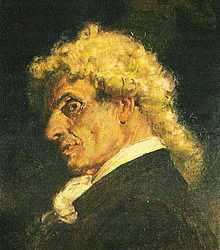
Devil’s Trill and Previous Events:
To save you of the quest of searching in Google, and giving a very fast summary; Tartini was one of the most important musicians of the Baroque, a violinist who could be described as someone of bad character, because it is known that when he was young, when he heard someone better than him, he gave him a great attack of fury, which forced him to exile himself to practice in absolute loneliness, for a long time until he felt satisfied. Don't get him wrong: he was a prodigy, but what really mattered to him was to make his talent grow to unsuspected limits.
youtube
One of the many nights in which Tartini was finally able to sleep after one of his arduous practice sessions, in dreams, he saw the devil himself. Far from being frightened by the presence of such a spawn, he found himself amazed by the personality of that being. This encounter took place in 1713. Before praying to God, Tartini handed his violin to the Devil, who began playing a romantic melody. According to a brief by astronomer Jérôme Lalande (Voyage d'un François en Italie, to be exact), it is said:
“It happened that, at one point, I gave him my violin and challenged him to play some romantic piece for me. My astonishment was enormous when I heard him play, with great bravery and intelligence, a sonata as unique and romantic as I had never heard before. Such was my wonder, ecstasy and delight that I was stunned and a violent emotion woke me up. ”
Although Tartini tried to play the melody immediately woke up from his excitement, he could not. However, thanks to this "encounter", Giuseppe was able to compose one of the most important works: the Devil's Trill, his interpretation of his “dream”. Who knows if this meeting was real. But what’s known is that thanks to this testimony, it’s believed that Tartini made a pact with the Devil. It’s known that, even at the end of his days, in the last minutes of the prodigy's life, he cried crying out to four winds that his version was a complete verbiage that would not reach even the shoes of the version that the Devil touched that night.
You have heard the song for a good part of the reading.
The Story of Stanford Pines:
There’s no need to fully tell the story of our favorite six-fingered man: nothing more will have to be fixed between his adolescence (understand the event of the machine destroyed by Stanley) until when the Portal absorbs it.
Point A): The Slip
For Ford, after having dedicated who knows how much time to make his ticket to a good future, and that Stanley had broken it, that destroyed his soul. Imagine what it must have felt: an immense feeling of betrayal and great pain in the heart. After that, we all know the rest of the story:
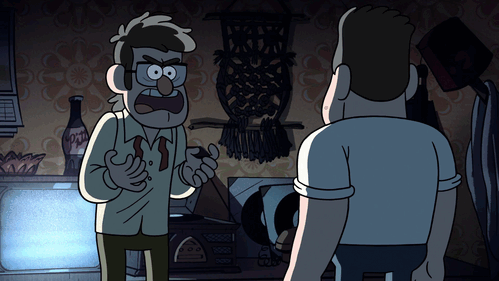
Point B): The Self-imposed Enclosure
When Stanford went to Backup Smore, and trying to think what he would do with his future, taking advantage of his abilities, he did something different. Unconsciously obeying the foolish words of the abusers of his childhood, he decided to devote the rest of his life to rarity. And in Gravity Falls, using his own words: "I found my Bermuda triangle." Trying to find an answer to all the oddities of the town in the woods, he was able to find that cave in which a serpent tongue demon tempted him.
Point C): The Consequences
Loneliness. Bill Cipher wanted to enter. And Ford opened the door for answers. The cost, oh, the cost: the price for knowledge would be seclusion, paranoia; the madness.
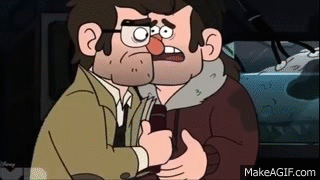
And then ...
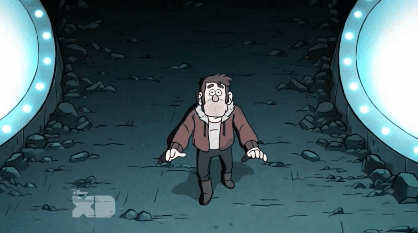
the last price to pay ...
Putting the Puzzle Pieces in Place
First; the moment of inflection. For Tartini, it was when he heard the other violinist. For Stanford, it was Stanley's "betrayal."
Second; the closure for ambition. Tartini was so dedicated to his music, an almost insane obsession, reaching the point where Tartini could practice for twelve hours a day with hardly any rest. And with Ford it was the selection of his destiny.
Third; the deal with the unknown. As if it were a work worthy of HP Lovecraft, our gifted men made a deal with an evil being, and perhaps, of an almost incomprencible origin - this is much stronger in Stanford's case, and if you think hard enough, We don't know Bill's origin, so he can be given an origin of cosmic horror.
And finally; the time to settle debts. Tartini, was with his dead, or more specific, with the fact that he could never compose a work as perfect, as sublime as that of the Devil. And the price of Ford was the loss of his faculties on a certain scale, and the accident with the Portal.
I may be catching the logic by the hair: the coincidences are very repeated, and for anyone who has two front fingers will think that it was a mere coincidence, and I’m forcing a pseudo theory with some research and reasoning. Do you know how the first world war started? One Gavrilo Princip killed an earl, duke, but he was someone important; I think it was from Denmark.
The license plate of that important man coincided with the end of the war: November 11, 1918.
Perhaps a few may come to wonder how I put together the theory, and that has a relatively simple answer: I am that type of person who studies maths by listening to Mozart's Requiem, the Four Seasons of Vivaldi, or the Beethoven Ninth.
Cybergraphy:
-https://es.wikipedia.org/wiki/Giuseppe_Tartini
4 notes
·
View notes
Text
Primrose is useless (and here’s why)
*slight spoilers for Octopath Traveler and Persona 5*
In my 50 hour, several month long voyage through Octopath Traveler, I have learned a number of things about the game. I have learned that Alfyn, while sweet, has a vindictive street a mile wide. I have learned that Cyrus, though oblivious, is actually quite charming. And finally, I have learned that Primrose, as a fighter, is useless.
Now, before you come at me with flaming torches and pitchforks, shouting about You just don’t like her as a character!- her character has nothing to do with it. I like her story, in fact, I would say it’s one of the more unique stories in the game, which is saying something (besides Tressa’s. Hers is just... ugh). Wants to get revenge for her parent’s murders and her family’s fall from grace in the aristocracy? Sign me up. Her personality? Also a win. It’s sarcastic and flirty, just the type of thing to keep me going in a bar full of drunk men.
Her actual gameplay? Not so much.
I have a theory that when Square Enix was making the characters, Primrose’s story was one of the firsts. But then, when they got through everyone else, they were left with Primrose, and their creativity kinda ran out.
My protagonist (or the first person I played as) was Ophilia, and I slowly worked my way clockwise around our heroes. When I got to Primrose, I was thinking “This is the character that has knives and dark magic! That’ll be useful!” And then she didn’t end up that way.
See, Primrose, at first, is useful. She’s one of the few that starts out with a knife, and the only one that has dark magic naturally. Sounds pretty helpful, right? Well, uh, not quite. There’s another character who uses a knife- his name is Therion, and he is one of two Best Boys- and has a higher attack stat than her. Which, okay, that’s fine. Primrose seems to be more focused on magic, like Cyrus. Maybe her dark magic is powerful?
Wrong.
I don’t know what it is, but the elemental spells that only attack once are incredibly weak. Like ice is absolutely fine at dealing damage, but as soon as wind is played, it feels like you did 30 points of damage (dealt by a very high leveled character!) Dark magic, in particular, seems to have gotten the short end of the stick in that the spells just aren’t very powerful. Period. I’ll use them to break an enemy’s shield, and that’s pretty much it.
‘But if she uses such weak magic then why does she have such high SP?’ You may be asking. I’ll tell you, friend- it’s because she buffs others. Buffs, in itself, isn’t bad. In some cases, they can even be incredibly useful, like when you want to defeat an enemy quickly. But besides boss fights or impatience, I’ve never really used buff spells, and I rarely use them during boss fights
Finally, the big cherry on top- her ability. In case you don’t know, one of Octopath’s game mechanics is special talents the character uses during their story or regular gameplay. Such abilities include Olberic and H’annit’s challenge ability, Therion’s steal ability, and Ophilia and Primrose’s guide/seduce ability.
Abilities in Octopath are often used again, like with H’annit and Olberic. However, besides H’annit’s ability to challenge others to a duel, she can capture monsters to summon again later, differentiating herself from Olberic. Primrose doesn’t do that. Ophilia has the skill Guide, where she can talk to townspeople and summon them later in battle for help. Primrose’s skill, Allure, does the exact the same thing with no variation. See where I’m going with this?
With all four of these problems mixed together, my motivation to use this player is pretty low. If one of these things were by itself, it would’ve been fine. If she used knives but her dark magic was pretty good? Cool, I’ll use her. If she had the same ability as Ophilia but good at attack? Eh, I could ignore it. But it was the fact that everything she could do was done better by other characters was what really made me lose my incentive to use. To be honest, she kinda reminds me of Haru from Persona 5, with a few differences.
For one, I actually had a reason to use Haru. She’s the only one (besides Joker) that is able to use physic moves. For another, when I didn’t need to use her, she still earned EXP from battles. I wish Square Enix did what ATLUS did, where characters still earned EXP and leveled up even when they weren’t being used, but alas, they did not. Because of this fact, whenever I wasn’t using Primrose, the others’ levels would slowly creep higher and higher, up into the 40s, while poor, poor Primrose stayed at lvl. 20.
The thing with Octopath is that, despite having to juggle through and play 8 different characters, you can only have four party members with you at a time. This can lead to some characters being forgotten until you reach their story, or having to grind for several hours until everyone is at an acceptable level. This cycle of continually being forced to grind, play, forget with Primrose led to my motivation and reasoning to use her to become nonexistent. After all, who wants to use a character with skills and abilities that were already done better?
In short, Primrose, as a playable character, was unneeded. With her forgettable and, quite frankly, lazy abilities, need for grinding every chapter, and overall lack of motivation to use her, it is with no surprise that I think she is unhelpful.
I really want to use Primrose, honestly, I do! Her story seems really interesting (from the first two chapters I’ve played through) and her interactions with other characters during travel banter feel really genuine and fun. It’s just, with all of these things piling up against her, I can’t be bothered to use her as much as Cyrus or Therion. At the very least, I can say that she isn’t my least favorite character. That spot belongs to a certain merchant.
Thank you for listening to me rant about this. It’s been building up for a long time. It was kinda fun to write all this out, if I’m being honest. Maybe I should do it again for Tressa... welp, that’s something entirely different. See you next time if I do this again!
#octopath traveler#primrose azelhart#and her abilities#liner rants#although this is more an essay than a rant#bit of persona 5 in here
17 notes
·
View notes
Text
The Voyage So Far: Paramount War (Part Two)
east blue (1 | 2) || alabasta (1 | 2) || skypiea || water 7 || enies lobby || thriller bark || paramount war (1 | 2) || fishman island || punk hazard || dressrosa (1 | 2) || whole cake island || wano (1 | 2)
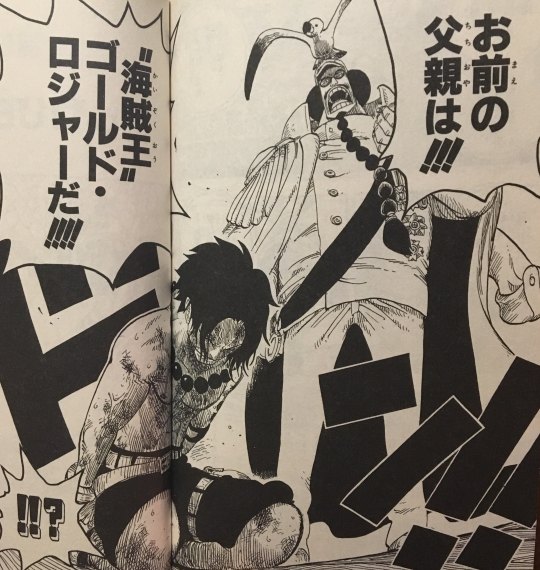
ace’s execution is, in a way, the exception that proves the rule when it comes to one piece’s themes of blood and family. ace is set up to die for the crimes of a father he never knew and never wanted, and he does die here, but in the end he dies for the family he did choose, in the form of luffy, rather than the one he didn’t.
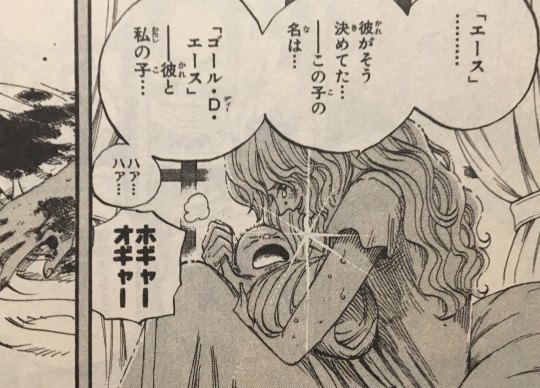
god do i wish we knew more about ms portgas d. rouge. with ace’s storyline pretty much wrapped it looks unlikely that we’re going to be learning more about her than what we got, which in my opinion is an absolute tragedy, because what little we do know about her is amazing and she’s an absolute badass. oda give us more female ds please.
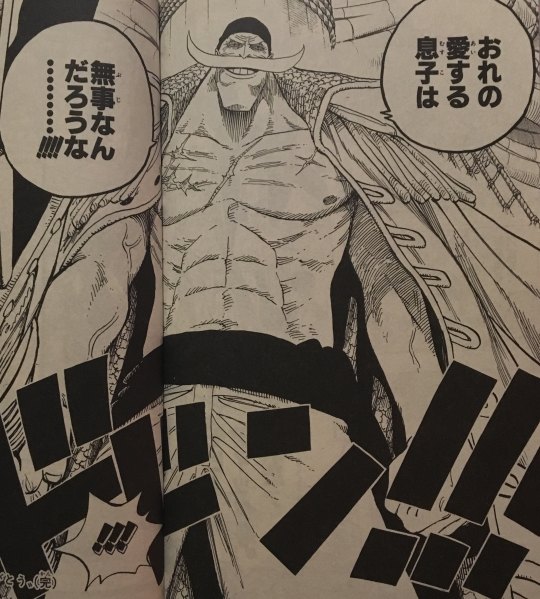
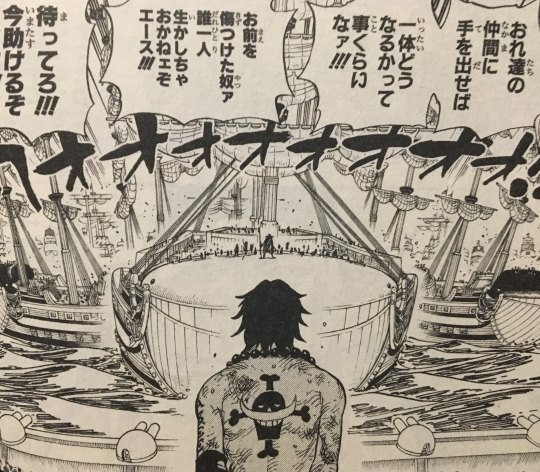
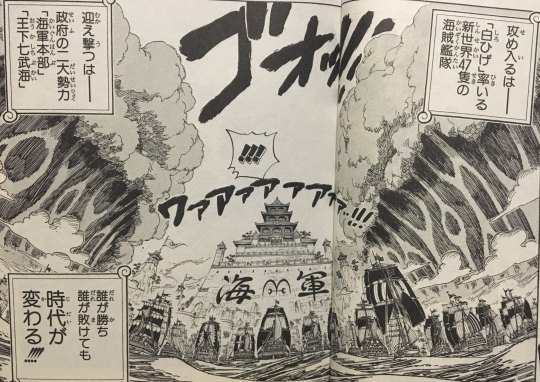
whitebeard’s power is so cool. it might be one of the visually coolest devil fruits we’ve ever seen, in my opinion. he he causes earthquakes and tsunamis while far past his prime; he pulls the sky apart with his bare hands. this whole arc is world-shaking, and whitebeard’s power is perfectly appropriate for it.
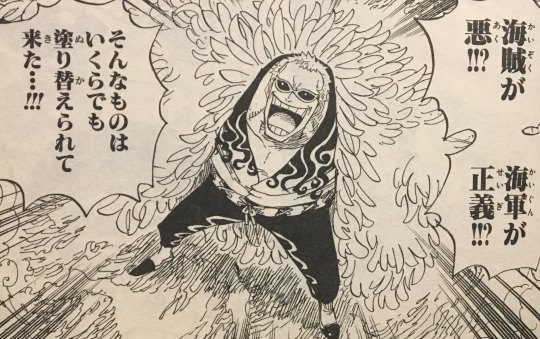
doflamingo’s speech on justice and rightness is one of the most well-remembered quotes from this whole saga, and rightly so. i’ve always found it fascinating, myself, because he’s right. he dead-on hits how the one piece world works- the world government and the marines rule the world not because of any inherent actual goodness or justice or right, but because they won a war a very long time ago.
in a way, this reminds me of blackbeard’s line of “people’s dreams never die” from jaya. i like how oda isn’t afraid of letting his villains be right about the themes of the story, sometimes even having better awareness of them than the protagonists.
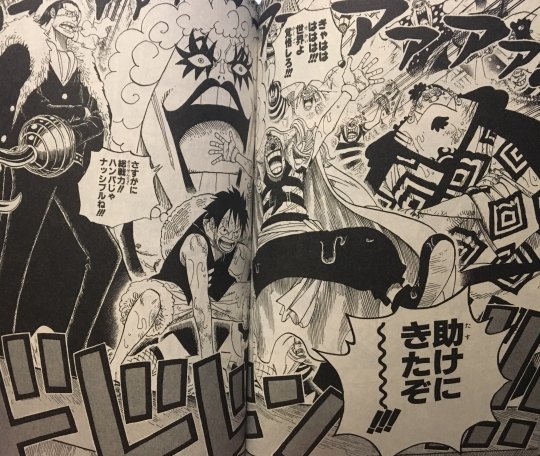
man, if i had to pick a single favorite spread out of the whole manga, it might be luffy’s marineford entrance. it’s so epic, and so completely unexpected for everyone else there. absolutely nobody was expecting strawhat luffy to drop out of the sky with a posse including two former warlords. it just makes me grin!! so much!!
it also gets followed up by a solid two pages of just people’s reactions, from smoker’s “what the HELL is he doing with CROCODILE” to moria’s immediate incoherent rage, and i just love that the world and cast of one piece is so well-established and built up that we know exactly how all of those people know luffy and why they react the way they do.
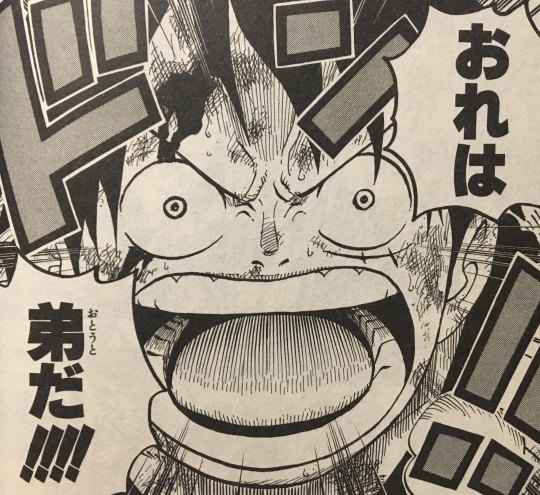
going back to what i mentioned in the last post about marineford being luffy’s conflict of interest arc, i’d say it’s also the only time where he isn’t the future king first and foremost. in this arc, before anything else, he’s a little brother.
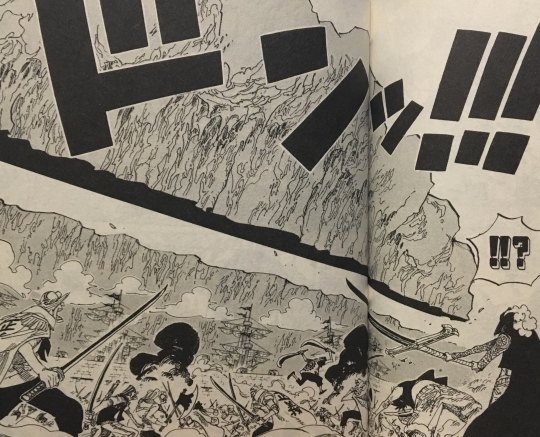
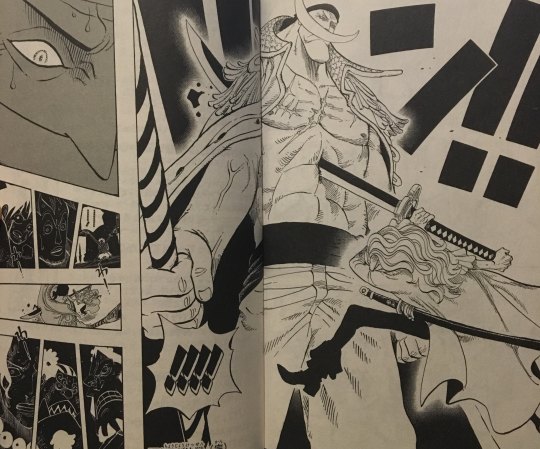
there are a lot of what-if moments in marineford. moments where you kind of have to ask “what if this specific thing hadn’t happened, had gone differently?” would things have turned out differently? squard’s betrayal is one of them. does this change the outcome? would whitebeard have been able to survive if not for this injury? there’s no way to know. marineford is a lot of little tragedies, and they just pile up and up.
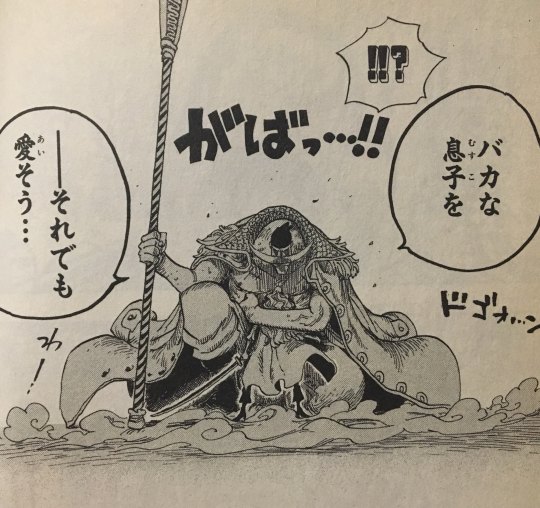
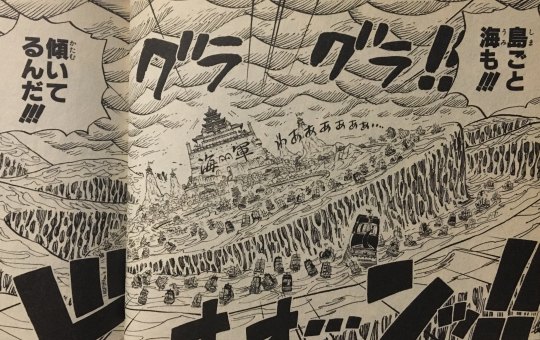
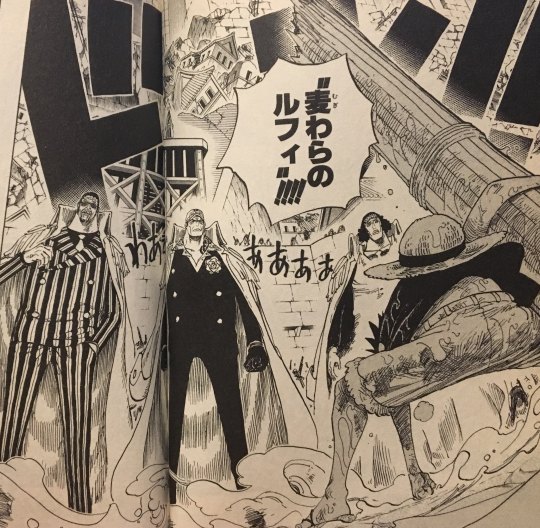
marineford has just so many incredibly striking spreads. all of the momentous moments (and there’s a lot of them, in this arc) are done full justice. this is such an image heavy post just because marineford is such an incredibly visually strong arc.
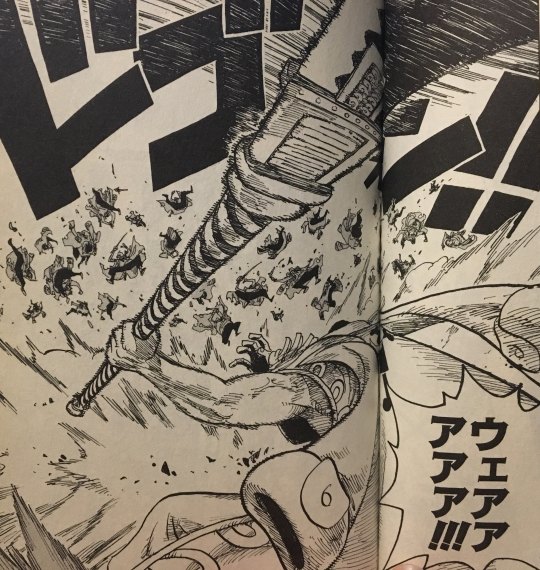
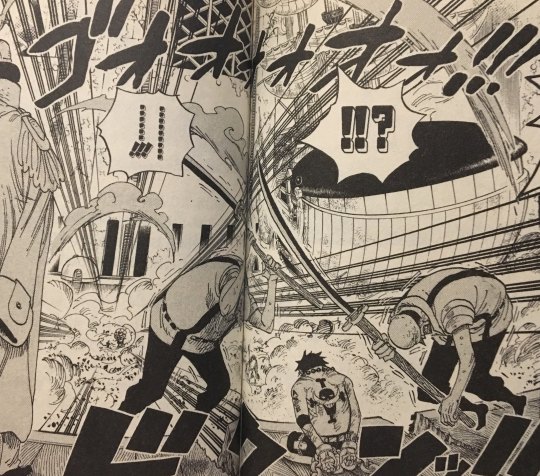
conqueror’s haki is so cool and i love the way it’s set up and built up throughout this saga, with luffy’s constant inadvertent uses of it, from duval’s bull to marigold and sandersonia to the wolves in impel down, all leading up to this moment.
i’ve heard people complain about conqueror’s as kind of a deus ex machina, but i honestly love it, it’s very cool and honestly i think it just seems to fit luffy as a power. if there was ever gonna be a character who turned willpower into a weapon, it would be monkey d. luffy.
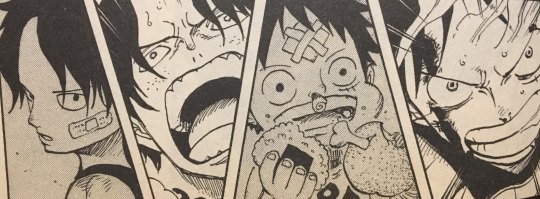
i’m gonna take this chance to talk about garp, because this sequence of panels is heavily implied to be garp’s thoughts just before luffy punches him down, and it hurts. garp is a flawed person who makes some bad choices, and there’s no arguing that, but i think it’s very obvious he really, really cares about his grandsons, even if he never could understand them as people and that they never would have been happy as marines. and that’s just tragic, really.
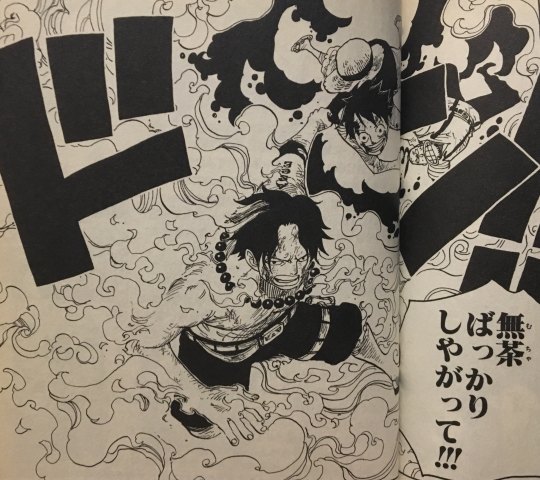
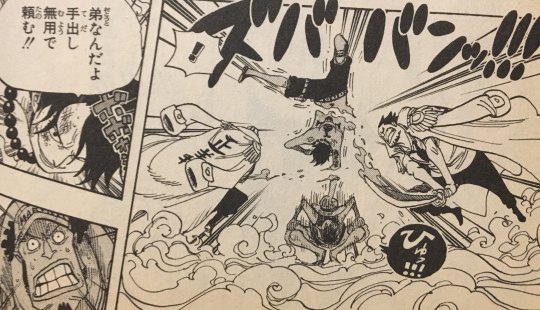
the moment ace gets freed and the brief span of time where he and luffy can fight together feel so triumphant, and i think it’s one of the reasons the final tragedy of marineford hits so hard and feels so cruel, because luffy succeeds, here. he saves ace. he gives absolutely everything he had and makes it, and saves ace. the ultimate failure isn’t his. there was nothing more he could have done.
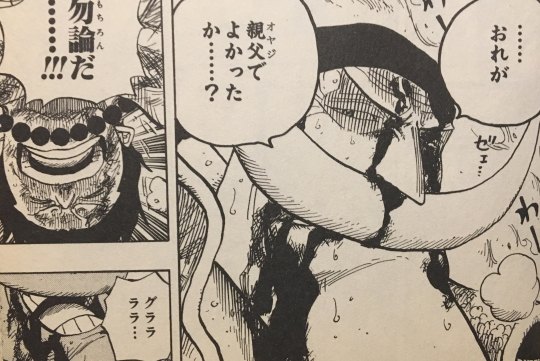
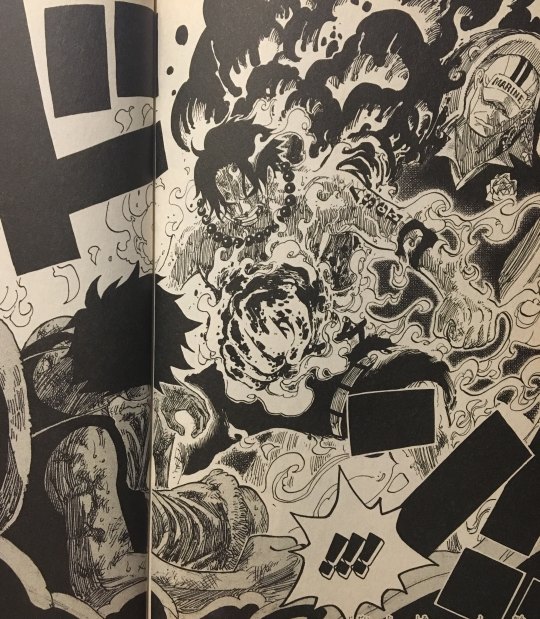
the first time i was reading one piece, i hit this page (which is also the last in the volume) and had to put the book away, take the bus downtown, wander around for a few hours, and buy myself some candy and some new books before i started feeling okay again.
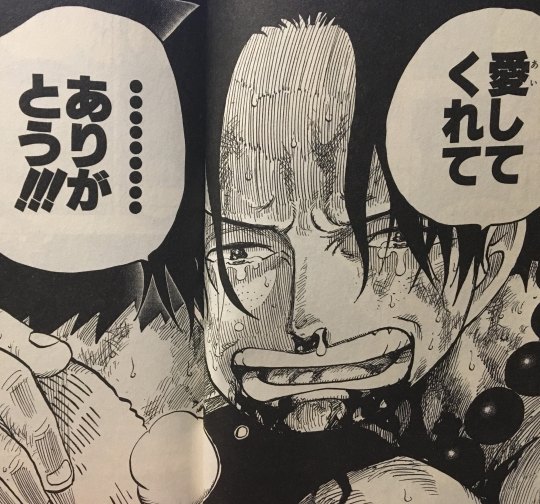
the thing about ace’s death, i think, is that it’s a tragedy, but it also feels so completely essential to the story going forwards and luffy’s character growth specifically that it’s really, really hard to imagine one piece without it. there are a lot of (really excellent!) fix-fics out there for marineford, and although those are often really good and their authors super talented, i think it’s really hard for them to ever hit the same way canon does with regards to this.
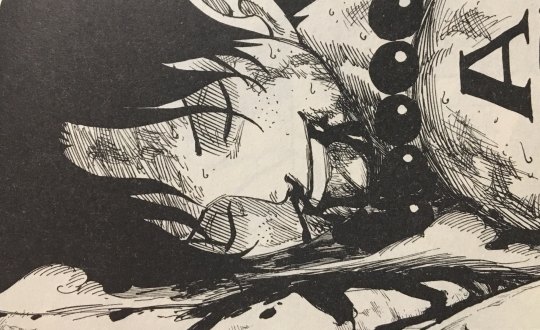
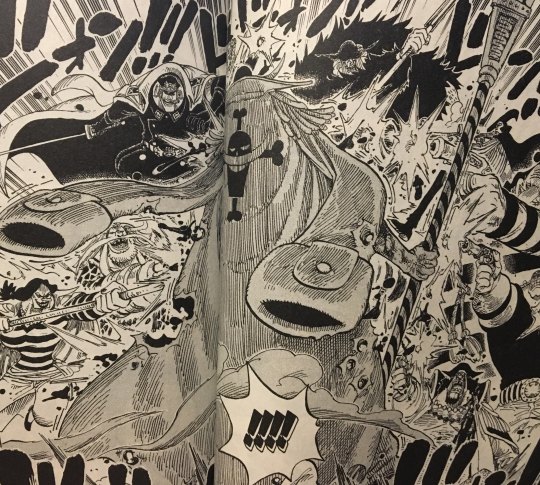
i always think of this scene specifically in contrast to zoro and mihawk’s fight, back on baratie. zoro and mihawk are both people who believe in honor in battle, true victory or death, and that’s reflected in their fight, in zoro’s refusal to turn and run even in the face of imminent death, and mihawk’s respect for that resolve. whitebeard, too, is an honorable man. he refuses to turn to run, even when facing certain death.
the blackbeard pirates, however, are not.

i do enjoy how, just like roger’s, ace’s execution backfires tremendously on the marines. this was entirely a predictable outcome, too! this exact thing happened twenty years ago! the marines don’t learn. they don’t change. they’re so assured of their own rightness and power that they make stupid mistakes like holding a massive public execution after the last one blew up in their faces.
(this is why they need coby so badly, for the record, and why it’s important that he still decides to become a marine after witnessing their corruption firsthand in shells town. the marines are long overdue for a reformation, one that orients them towards real justice.)
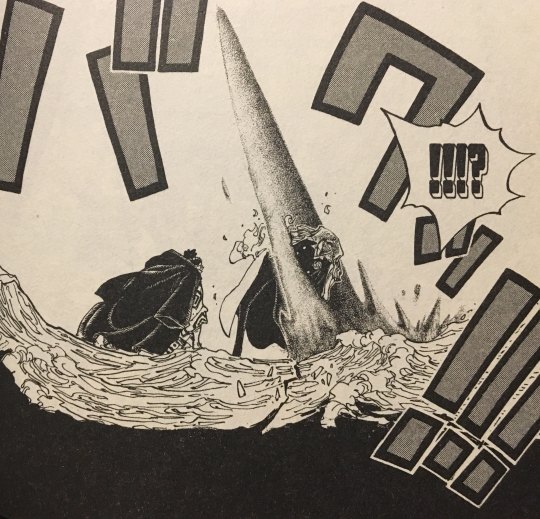
i really, really enjoy crocodile in this saga. mostly because he hasn’t been redeemed at all, he’s still pretty much the exact same kinda awful person he was in alabasta, he’s just on luffy’s side this time, and it lets us see him in a better light, when he gets angry at whitebeard for nearly dying or when he helps luffy and jinbe escape to keep the marines from getting their way. few of one piece’s characters are truly so one-dimensional as they can seem, and i really appreciate that.
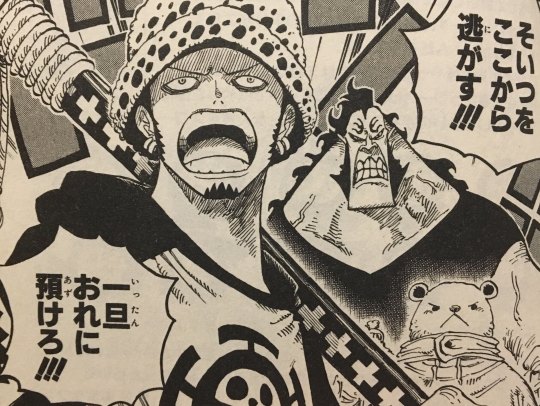
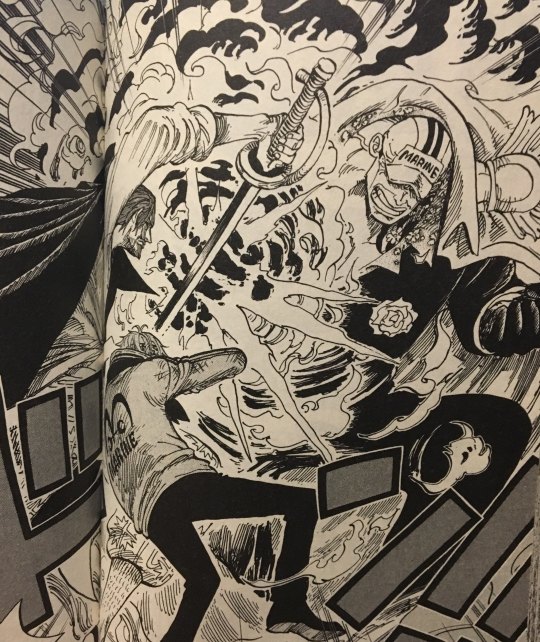
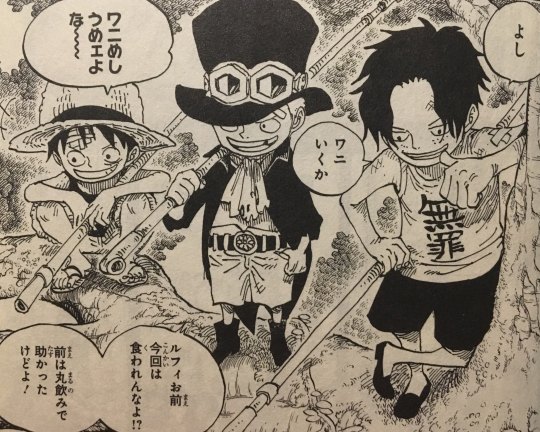
i really really love all the interactions between luffy, ace and sabo as kids. they’re so fun and bounce off of each other so well. even though we only see them together for a brief time, they really feel like siblings. (which of course only makes later events hurt so much more.

i’ve always been a little fascinated by the fact that it takes us this long to get luffy’s full backstory. it’s almost a fakeout, because we get part of his backstory in the very first chapter, and we’re kind of led to believe that’s all there is. it’s not until ace’s introduction nearly two hundred chapters in that we’re given any indication there’s more.
but at the same time, it makes sense. marineford is luffy’s focus arc, as arlong park to nami or thriller bark to brook. he hasn’t had a focal arc that’s really about him before this, while all his other crewmates have. it makes sense that this would be when he finally gets his flashback.
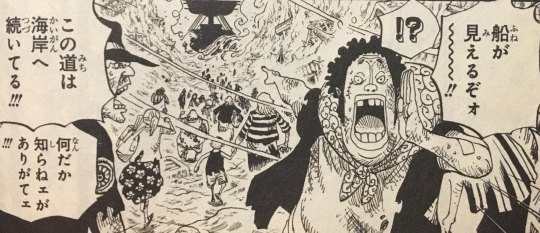
i think it’s cool that dragon and the revolutionaries show up at the grey terminal fire, because it’s one of the only looks we’ve gotten so far into what their actual regular operations are like. and, of course, they’re saving people. i really like this about the revolutionaries, that helping people in trouble is basically their modus operandi, when pretty much everyone else in one piece’s world mostly does saving on an incidental basis if at all.
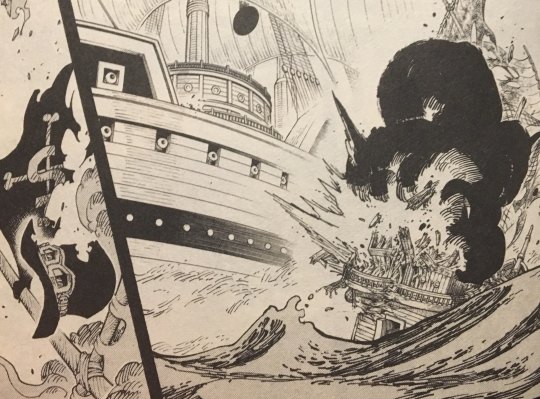
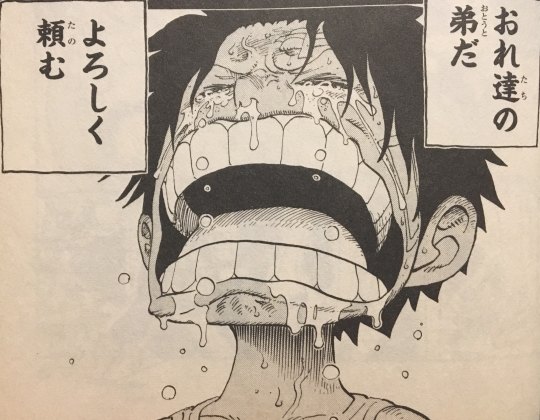
i think a lot about how the last line of sabo’s letter to ace is also both of their last words to the strawhats.
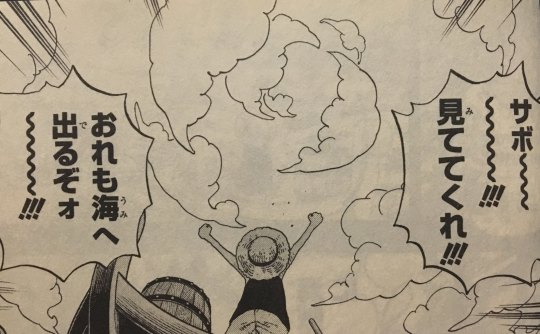
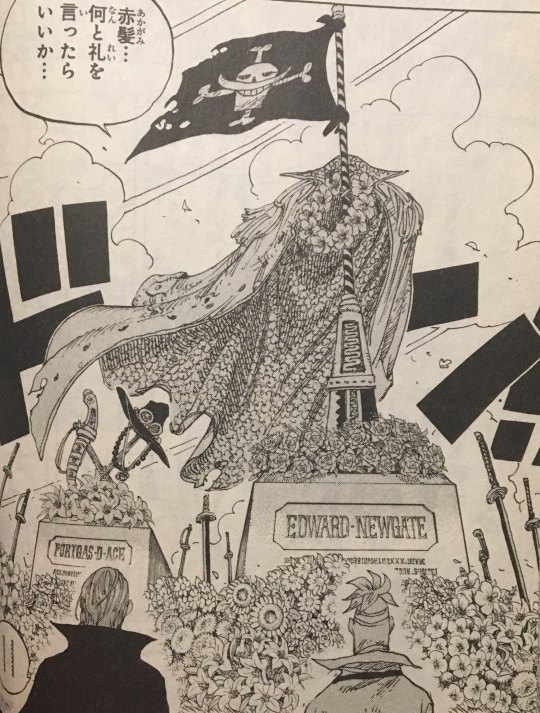
death in one piece always feels much realer and more impactful to me than in most other series, and i think this is part of the reason why: in one piece, we are always shown the mourning. nami at bellemere’s grave, carrot grieving pedro, ace and whitebeard’s funeral.
there are fewer deaths, comparatively, than most other series, but they’re given so much room to echo. we’re still feeling the impacts of ace’s life and death in the most recent chapters of wano. it ties into the theme of inherited will and all the way back to hiriluk’s final speech, of men not being dead so long as they’re remembered.
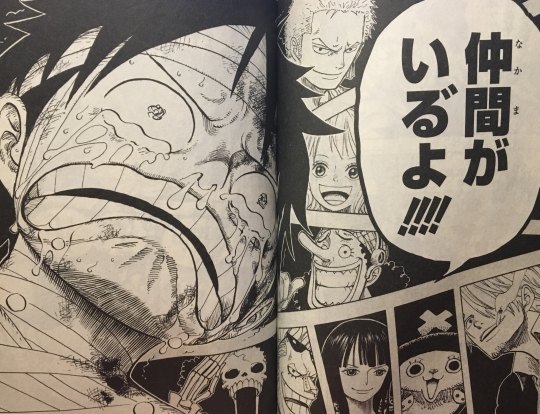
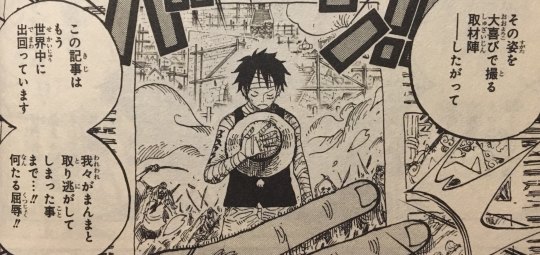
the picture of luffy at marineford always kind of strikes me. he looks so young and so solemn, and yet much more himself than he did when we last saw him losing his mind on amazon lily. i really like it.
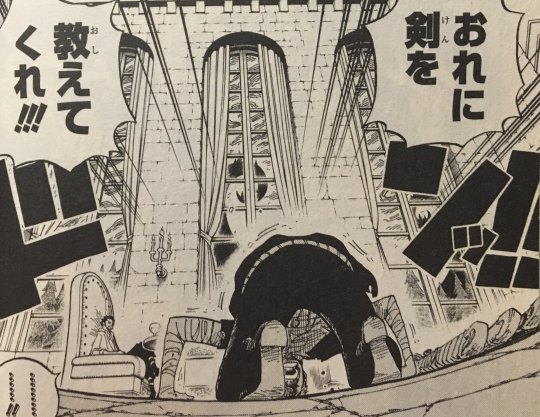
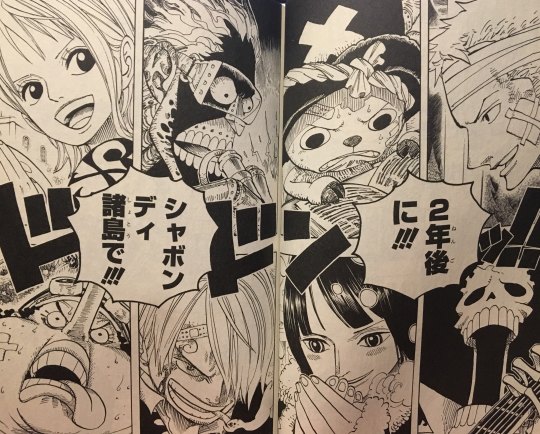
sometimes i just think about the sheer depth of trust and love the strawhats must have in each other to separate for two years, far longer than they were ever together, to solely dedicate themselves to improving for the sake of crew and captain. none of them even hesitate, and none of them ever doubt that the crew will be reformed at the end of it.
after all, luffy keeps his promises.
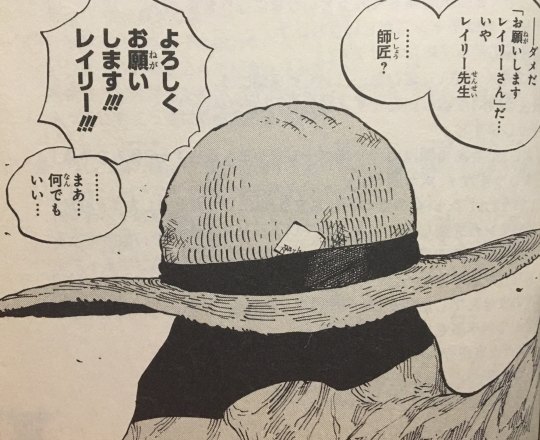
261 notes
·
View notes
Text
An Outgrown Genre. Christian Literature
I’ve read a lot of what can be termed ‘Christian literature.’ There are a lot of different types of stories under the broad umbrella of Christian Lit. I’ve read Christian Historical, Christian Romance, Christian Horror (yes, this exists), the more difficult to find Christian Science Fiction and of course Christian Fantasy, the most famous being Tolkien and C.S. Lewis. There’s Christian Western and there is Christian Mystery and Thriller. And eventually, somewhere between high school and college, I had to stop reading it. Though, there were a few books I really loved; Lori Wick’s Californian & Kensington Chronicles series, Frank E. Peretti’s horror novels, certain Gilbert Morris House of Winslow books, Lawhead’s Celtic Trilogy (which was better than his take on Arthur, I couldn’t finish the second book of that travesty), Francine River’s Mark of the Lion series, Roger Elwood’s Angelwalk Trilogy and Jane Peart’s the Brides of Montclair. (All of these should tell you how long ago I stopped reading Christian Lit.)
Of course, no one was twisting my arm and forcing me to stop reading it. I stopped reading voluntarily on my own. There were several reasons for this. One, I was growing up and I just stopped relating to the characters in the books. Two, most Christian Literature has very distinct writing style. The authors tell you the story instead of showing you the story. It was setting my teeth on edge and making my brain feel fuzzy. And lastly, I realized that in almost every Christian Lit book I read (Tolkien, Lewis and maybe Lawhead being exceptions here) the message was coming before the story.
Putting the message before the story is the last thing any writer should do. The story, the characters and their conflicts and what happens should be paramount to what the book is about. However, in Christian Lit, it felt to me that what was more important was putting in Bible verses every 50 pages and putting in some moral lesson. A lot of times, these moral lessons wouldn’t even be necessary if children and adults weren’t being taught the exact opposite moral lessons at home and in Sunday School. (My favorite of these was ‘it’s okay to love your husband and be physically attracted to him and enjoy sex.’ Really? I didn’t know that. I thought sex was a dirty thing and being physically attracted to the opposite sex is just wrong, much less loving them!) And most, if not all of the stories eventually devolved down into the protagonist discovering Jesus as their Lord and Savior (while finding true love of course with a good Christian man or woman.)
Now, I understand there is a place for these types of books. Lordy is there a place for them. They wouldn’t sell so well in the Christian community if they weren’t popular and at times necessary. However, there comes a point where I didn’t want to read yet another story about some male or female finding God. I was ready for the grown up version of the Voyage of the Dawn Treader (and even that has Eustace’s redemption story in it, but at least his turning into a dragon and back was entertaining and not obvious as ‘conversion’.) Give me a story about a protagonist that has been a Christian a long time and their being a Christian is just a background point and not the whole point of the story. What conflicts do they face in their life that it doesn’t hinge on whether or not they are a Christian?
I know a lot of people talk about the Christian life being deep and profound and I’m still not sure I get that. Deep and profound seems to me what you make of life rather than what religious tenant you hold to. I’m sure there are Buddhists and Muslims who feel their lives are deep and profound, the same for atheists, thank you very much.
Parts of Frank E. Peretti’s books almost focused on story. Then, he fell back on the whole “must redeem a protagonist” and I lost interest even if there were angels and demons and maybe Nephilim! (The giant children of demons and human women.) Even the Left Behind series, as ‘thriller’ as any Christian Lit series get couldn’t quite get away from redeeming the ‘left behind’ protagonists of the Pre-Tribulation rapture. (I didn’t get to the last book, so I am beginning to wonder if the authors believe in a Pre-Trib and a Post-Trib rapture given the titles. Yes, these are the things that Christians argue about, will Jesus take the believers before, in the middle or after the tribulation or all three! I sincerely hope before. Sincerely.)
To me, Christian Lit began to feel like ‘preaching to the choir.’ You see, Christian Lit is written by Christians for Christians and really doesn’t get much traction outside of CBD, Christian Book stores and Church Libraries. There are the rare exceptions like the Left Behind series, the Shack or the Prayer of Jabez. My personal exception is “Heaven is for Real.” There is a trap in preaching to the choir, the choir agrees with you and nothing new ever happens. (I understand the current fad in Christian Lit is still the Amish.) Or, the choir apes what the rest of culture is doing instead of coming up with something new for themselves. (If you haven’t been inside a Christian Bookstore, it is sort of a surreal experience to see the Home Depot parody t-shirts and the racks of Christian “metal” music.) The last Christian phenomena that hit mainstream culture I remember is Veggie Tales. (And now I just showed how old I am.)
Now, before someone points out the Divergent author is a Christian. I know. And knowing this and knowing how the trilogy ends it makes a great deal of sense that she is a Christian (and totally missed the point of Christianity at the same time.) Divergent sort of feels to me like Harry Potter met the Matrix complete with the same fate as Neo without Harry Potter’s triumphant return from the dead.
See, that is one thing that Christian Literature tends to do right. They have hopeful endings. Since, that is one of the primary tenants of Christianity, hope. And this is one of the prime tenants of writing as well, thou should have a happy or at least hopeful or uplifting ending. I usually didn’t come out of a Christian book feeling unsatisfied with the way it ended. It was the fact that what could be really good plots got thrown aside for preaching and Bible verses. Usually the same Bible verses in fact. The Bible is huge, yet every author used the same verses in their books. It got really weird after a while and I skimmed those sections. I wanted a gripping story with conflicted and exciting characters or at least funny characters. Not to be bored by them dithering over Biblical passages yet again or dealing with modern female issues in medieval times (and sometimes these characters wouldn’t even have access to a Bible.)
My favorite thing about Christian Lit really was the cute and fluffy romance aspects of it. Since, Christian Lit removes the sex element almost entirely (except for the ‘being attracted and wanting to have sex with your husband is okay’ bits) the books primarily focused on the relationships between the characters and why the relationships could or would work rather than how sizzling their sex lives were. There are some days I really miss that aspect of Christian Lit. I like warm and heartwarming things!
I doubt that I’ll go back to reading Christian Literature any time soon unless someone can prove to me without a shadow of a doubt that the story is about the character and the conflict rather than the message of “Love God and marry a Christian.” I say this with utmost affection. Because it’s not that Christian Literature is horribly bad. (Sort of like romance as a genre isn’t horribly bad.) It’s just no longer for me.
1 note
·
View note